#so surreal to see a version that's so similar and yet so different to the version I know
Text
Finally (FINALLY) getting around to watching that old live performance of the Turnabout musical that's on yt!! We just finished Act 1 and it's really cool so far; they did such a fantastic job. Anyway brb in a couple hours after we finish Act 2 ✌️
#so surreal to see a version that's so similar and yet so different to the version I know#I understand why all of the bits that were cut in the new version were cut.#kind of a shame for a couple of them though because there's some neat stuff here!#Phoenix's confrontation with Redd in the Bluecorp office is pretty legendary in this old version. his big hero moment in Act 1 imo#(the new version makes up for it by making him take more control in the actual case. instead of Mia saving him lol)#also this is neither here nor there but#I lost my mind a little bit when Edgeworth walked out bc it's maybe one of the best Edgeworth cosplays I've EVER SEEN#like just LOOK AT HIS HAIR OH MY GOD
1 note
·
View note
Note
hey, ali! i feel your pain about the tbosas adaptation! i cried so much during the movie but not because i felt emotional, seeing MY book comes alive on screen but because we were robbbbbbbbbbed and shot 😞😞😞😞😞😞 anyways, what's your opinion on the music tho? fav/least fav song? (my is the oldtherebefore and least fav the 0livia r0drigo's one)
hey, lollis!
‘robbed and shot’, exactly. i couldn’t have said it better myself because unfortunately, that’s spot on 🥲
I LOVED THE MUSIC! a dystopian reflection of our reality through intentional use of folk/bluegrass music is something that resonates strongly with me. i mean, they knew how to strike the right chord in the hearts of book readers for sure! *the only other thing i wish was different about the music it's the variety of tempo and rhythm because as much as i LOVED the unified sound of LG's songs, i would prefer each song to have its own individual tune and ~aura)
my absolute favourite adaptation that they did was 'nothing you can take from me' (boot-stompin’ version); i am utterly in awe of the powerful passionate energy that they gave to this song?? also i loveeed the similarity of rhythm and tone between 'nothing you can take from me' and a traditional american folk song 'man of constant sorrow', i kinda feel it was a deliberate parallel which worked just great. (also i’m glad they added maude ivory’s 'keep on the sunny side'!)
my least favourite is perhaps 'the ballad of lucy gray baird'?.. and though i did enjoy rachel’s rendition (she copies a young dolly parton in such a warm-hearted respectful manner!), and the respect for traditional appalachian music, she sang it in a cheerful 'to hell with you!' manner which is less intense and intimate that i remember it from the book to be? to quote tbosas here: 'the haunting melody set the tone, and her words did the rest as she began to sing in a voice husky from smoke and sadness' – the movie version really failed to capture both the haunting tune (their version doesn't really tell the story musically because of a major key) and the lucy gray's vulnerability here for me. in the book she did what carrie fisher told us all to do: 'take your broken heart and turn it into art' while in the movie she isn't even angry at billy taupe?? like his betrayal (and her place in the games) is not a big deal? she's openly rebellious and sassy with out of place 'i need no man' attitude and that simply didn't work for me personally.
it took some time for 'pure as the driven snow' to grow on me (i expected it to be more of a waltz-like, similar to maiah wynne's cover), but i'm coming around to it. yet… i wish it was STAGED differently??? they had to combine certain scenes and songs in the film but it was such a SURREAL idea to meld PATDS with 'sell you for a song' setting? and it took away so much from that moment of love and connection and unconditional acceptance, where lucy gray is finally ready to be emotionally unshielded in front of her lover (maybe for the first time ever)?? it was a PIVOTAL snowbaird moment but they needed to blend two songs together because obviously PATDS can't be love confession in form of a song because it should be taken as an ominous warning instead (duh!). 'bitch you better not turn out to be a bad guy even tho i knew you were a villain all along' :??? and it could've worked in its own angst-y way, if there had been any development in snowbaird love story?? but since movie!they are full on survival the whole time (there's no canonical teetering on the edge of an actual fondness/love and survival instinct), PATDS makes no sense at all. so… i extremely frustrated by the use of PATDS on screen but at the same time i love the sound of the full version on the soundtrack album.
annnd i'm actually IN PAIN because they had the audacity to leave so many songs out?? especially given their ties to the original trilogy?? 'deep in the meadow' aka rue's song???? 'the valley song' aka the one peeta mentioned seeing katniss sing at school when they were children???? the festive 'crawling to you' ('that thing i love with') likely performed at finnick’s wedding?? idk maybe it's a musical nerd who is speaking in me but i wish they could have included more of the book songs at least on the album, if not in the actual movie (even tho i'm still sure, it would've been possible to present the whole complexity of this book AND its poetic side too, if they decided to split the film in two).
[the score album wasn't much to talk about but 'snow lands on top' piece tho… vivid, striking, remarkable]
#wifeofthewolves#ask#my ramblings#dolly sorry it's a bit longer and more spiteful than i expected it to be#i have to agree with you 'the old therefore' is mesmerizing and breathtaking + rachel's vocals are phenomenal there#i'm not a fan of how aggressive her portrayal of lucy gray generally was#but that raw anger in 'the old therefore' felt so right it reminded me of eva noblezada's eurydice even#btw rachel's first line from 'the reaping song' sounds so similiar to samantha's eponine#actually first time i heard it i was so shocked i stopped the song to immediately rewind it back to the beginning lol#and i'm glad i listened to the album before i watched the movie#because welllllllll the music is better#i wish we could've replaced 'can't catch me now' with any canon song tho because i really don't care about miss rodrigo#also also the movie’s musical arrangement of the wordsworth song is kind of boring sorry#anywayssssss tell me more what do you think
14 notes
·
View notes
Note
Do you game? I recently got a switch and gaming computer but I'm not sure what games to pick up
I do! I actually just lucked into a Playstation 5 so I'm really excited to see what games are available for that, but here are some of my favorites that are available on Switch or on PC:
Switch:
I think a lot of these you can also find on PC, but I played them first as Switch games, so that's why they're on this list:
Starting out with the classics, all of the Mario games are super fun and Switch exclusive. Super Mario Odyssey is my favorite of the Mario platformers, Paper Mario: The Origami King is a great RPG/puzzle game, and Luigi's Mansion 3 is a super fun action/adventure game. If you want to play with other people, Mario Kart 8, Super Smash Bros, and Super Mario Party are great.
Another group of classics are any of the Zelda games. These are action-adventure games where you play as Link, a hero who's trying to save Princess Zelda and prevent the world from being destroyed. I would start with Breath of the Wild, which is widely considered to be one of the best video games of all time.
If you like The Sims or other social simulation games like that, Animal Crossing: New Horizons and Stardew Valley are both super fun and you can sink a ton of time into them. In this same vein, I also really enjoyed Wylde Flowers, which has a little bit more of a story than other social simulation games.
If you want something that's just kind of unhinged, We ♥ Katamari and Katamari Damacy Reroll are puzzle-action games where you play as a little alien Prince who has to roll up objects on earth to try and impress his father, The King of All Cosmos. The Katamari franchise also has the greatest soundtrack of any game I've ever played.
If you want to be the most frustrated you've ever been in your entire life, Cuphead is a run and gun game drawn in a really cool 1930s style (it's really fun, I swear).
Okami is a action-adventure game where you play as Amaterasu, a wolf who uses the power of the Celestial Gods in order to save the world. The game is done in a woodcut, watercolor style, meant to look like Japanese ink-illustration, and it's just so beautiful.
My personal favorite game franchise has always been Kingdom Hearts. These games are hack and slash action RPGs where characters from the Final Fantasy Franchise team up with Mickey, Donald, and Goofy from the Disney Animation Franchise to go to different worlds from Disney movies so that they can prevent darkness from consuming the universe (multiverse?). This seems unhinged, and that's because it is. 10/10. As a bonus, I think there's a free trial for the Switch version so you can see if you like it before you buy.
Most recently, I've been playing Disco Elysium, which is a role playing game where you're an amnesiac detective trying to solve a murder mystery. This is also considered to be one of the greatest video games ever made, but I haven't finished it yet, so I'm tentatively recommending it.
Some other games that I've really liked but that are maybe a little less accessible are Chinatown Detective Agency, The Stanley Parable, Return of the Obra Dinn, and Gris.
PC Games:
I'm actually not a PC gamer, but I do have a Playstation, and there's quite a bit of overlap in terms of where games get released, so here are some of my recommendations that you can find on PC.
Inside and Limbo, both puzzle-platformer games where you explore a surreal and monochromatic world. They're really beautiful and tense and are considered some of the greatest video games of all time.
If you want something in a similar vein but not as dark and tense, I really love Planet of Lana. It's a puzzle-platformer, but its design style is inspired by Studio Ghibli, and it has a really nice story about a girl trying to rescue her sister from hostile alien machines that have taken over her world.
For something really beautiful and relaxing, I love Journey, which is a indie adventure game where you are trying to reach a mountain in the distance. What's cool about this game is that even though you can't speak with other players, the game fosters an emotional connection between players. It was designed to evoke a sense of smallness and wonder in the player, and I think it does that really well.
If you want to play a game that - and this is true - sent me into an emotional tailspin for several weeks, Wattam is a puzzle-platformer where you play as the Mayor of a planet that's empty. As the game goes on, you unlock and befriend other inhabitants of the world, including trees, flowers, rocks, toilets, poop, and mouths by holding hands, uncovering secrets, playing minigames, and solving puzzles. It's designed to be a game that "makes people notice how our ordinary life is great".
Life is Strange is an episodic adventure game where you play as Max, a high school student in the Pacific Northwest who can turn back time. The choices that you make change how the narrative goes. Some people find this game kind of cringey and the ending is... kind of disturbing, so fair warning, but I think it's a really well-made game.
I'm sure there are others that I've loved, but these are the ones that come to mind. I'll add to this list if I think of more. Happy gaming! Let me know what you think if you end up trying any of these.
3 notes
·
View notes
Text
Alters drawings
I've always found it so interesting to compare our art with one another, because I can't describe how intriguing it is to see how much it differs, yet that there is consistency between them. Same goes for our writing sometimes, most of these are self portraits.
▃▃▃▃▃▃▃▃▃▃▃▃▃▃▃▃▃▃▃▃
Ryou 👻
I'd describe Ryou's style as very cartoony? Gives me a bit of those 60's anime vibes?

Nameless 🩹
Very sketchy, noticed this one also had two other versions. One of them being colored and the other somewhat gorey. But felt this one was the most clear.

Sunny 🖤
Sunny's art looks very surreal, almost as if you're stepping into a whole other world.


Orion 🌠
I feel like Orion's style is quite realistic while also being having it's own touch to it.

Shadow 🌒
Lots and lots of lines with a lot of pressure. Also, lots of blues, reds and black. Makes me feel like Shadow holds a lot of emotions while looking at this piece?

Eugene 👓
Eugene's art style kinda differs, one is a bit more simple, but you can immediatly recognize it by the round shapes and how cute it is!



Dipper 🌲
Dipper's style feels very similar to how he's portrayed in his source/how he draws himself in his journal.

I'd love to add more, but Tumblr only allows me to add 10 pictures max. -Blurry
2 notes
·
View notes
Text
Since the 2023 Record Collection Jam has been announced (go see the post here!), I wanna talk a bit about the games I've made for past editions of the jam a little bit.
The first full, published game I ever made was for the 2019 jam, and is what really started my path down game design! Before that, I'd dabbled in what a lot of people call "homebrew", making some playbooks and classes for other games, but honestly, that was still game design I just didn't realize it yet.
Anyways, the first game I made was Reaching in the Dark, inspired by High as Hope by Florence + The Machine, which is still one of my favorite albums.

This is going to be a smidge on the longer side, so the rest is under the cut!
Mechanically, it's loosely derived from PbtA (though I don't think I can rightly call it fully PbtA since it lacks full moves), and shares the 2d6+stat and success/mixed success/miss result distribution. There are four different classes/playbooks to pick from, each with their own special abilities. As a Form grows, they can gain new abilities or moves.
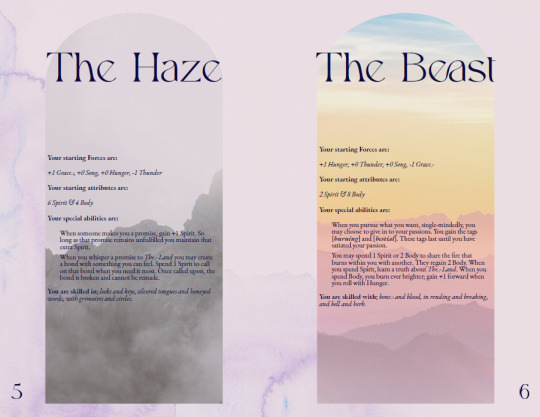
Players take on the roll of Forms, set adrift in the mist-filled Land, with the GM roll being the Choir, the guiding voice that determines how the Land responds to the Forms' journey of recollection, memory, and identity.
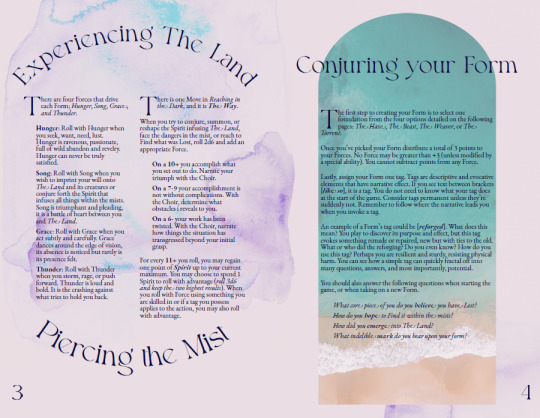
The game has a very airy, floaty feel, which was directly channeled from the album that inspired the game! There's a "bestiary" of different Denizens one can encounter in the Land, each one directly inspired by one song off the album.
After release, I created a Revised Edition, which gave the game a little more structure, which is the text currently available. A couple years later, I also gave the game a layout refresh, which is what you see in the images above. Here's the first page from all three versions side-by-side so you can see how the game grew over time. Starting with the initial jam version, the Revised Edition, and the new layout;
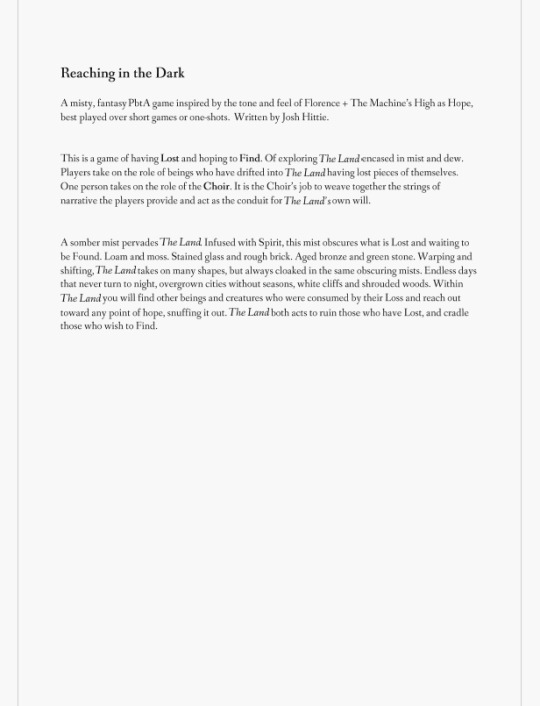
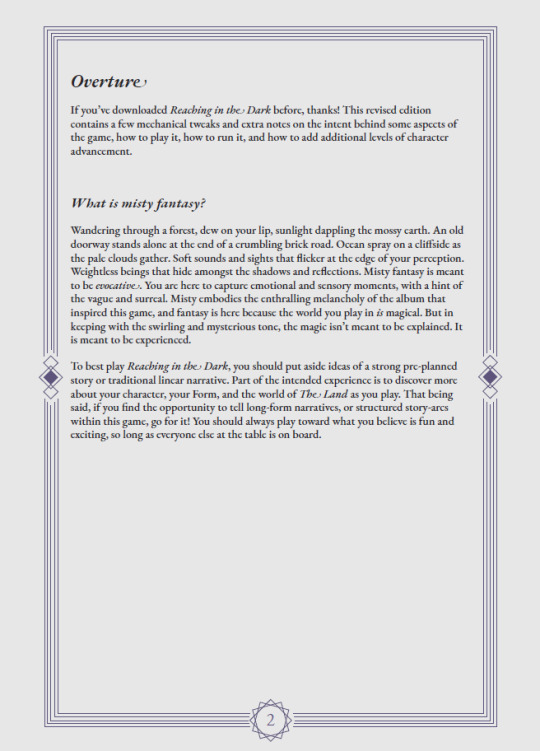

I think its important to highlight what a first game can look like! You don't have to go overboard to make something that resonates with people!
The second game (more of a setting with a small game bolted onto it) was for the 2020 jam, A Stroll Through the Patchwork Kingdom. This was inspired by the album Designer by Aldous Harding. The source album is this, folksy and esoteric jaunt, and I wanted to capture the surreal nature of the lyrics in the game.

Stroll ended up being a very loose "hexploration" of the titular Patchwork Kingdom, where each song off the album inspires one location-hex.
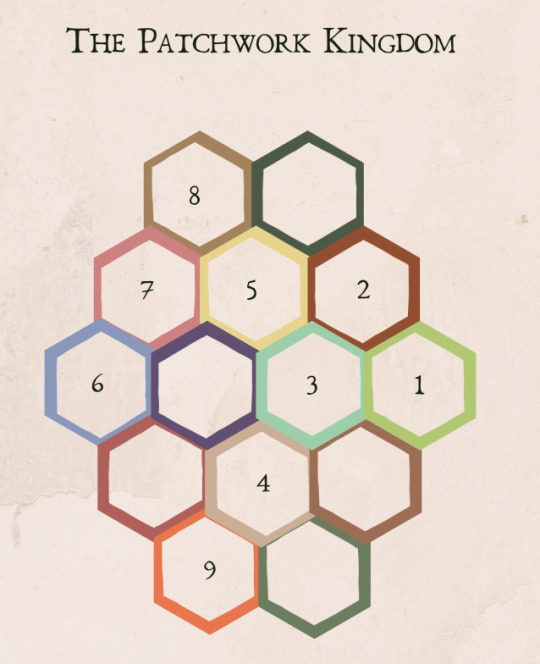

The final game is compact, surreal, and a bit "Alice in Wonderland-sy". Each location is a character in its own right, and comes with two different random tables to help the table fill out their version of that location and their own Patchwork Kingdom. I specifically left hexes on the map unlabeled so that the table could fill in their own unique locations as they explored.
I ended up tossing together a simple Blades/Forged in the Dark inspired attribute system for use with the setting, but the setting itself remains system-neutral.

All in all, Stroll is very compact, but still contains some of my favorite nuggets of writing. It could be fun to revisit that setting down the road, and expand it somewhat.
The last Record Collection game I've made was for the 2021 jam (I sadly didn't have the time for 2022's jam), and that was Fractal Romance inspired by the album Swimmer by Tennis. Which remains one of my all-time favorite albums.
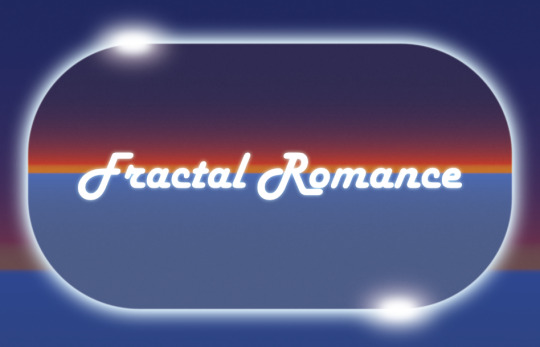
Fractal Romance is built using some core elements found in Belonging Outside Belonging games, namely evocative playbook moves and a token system. It's also somewhat of a spiritual sibling to Reaching in the Dark, exploring some similar themes of identity.
Players take on the role of Forms drawn into the endless Fractal Palace, where you just sort of, chill and explore. Locations and NOCs are randomly generated using regular playing cards (which are the tokens in this game). You also gain and spend cards by using different kinds of playbook moves, or you can play cards from your hand to change the situation at hand.


I call the game a hangout, because the "objectives" of the game are purposefully loose. Its really just about exploring the spaces you create with your friends.
The game has a hazy, vaporwave-adjacent vibe, and has been compared to Paradise Killer (which I only played after I ended up making this game lmao). Legitimately, I think Fractal Romance is one of the coolest games I've made.

Anyway, that wraps up my own personal Record Collection! Hopefully I can get something together for this year's jam. If anyone reading this has ever considered making their own game, I encourage you to try it out for this jam! Just pick your favorite album and have some fun.
Also, if any of these games interest you, I'm planning on putting them on sale and in a bundle while this year's jam is running, so keep an eye out for that next month.
#indie ttrpg#ttrpg#ostrichmonkey games#reaching in the dark#a stroll through the patchwork kingdom#fractal romance
31 notes
·
View notes
Text
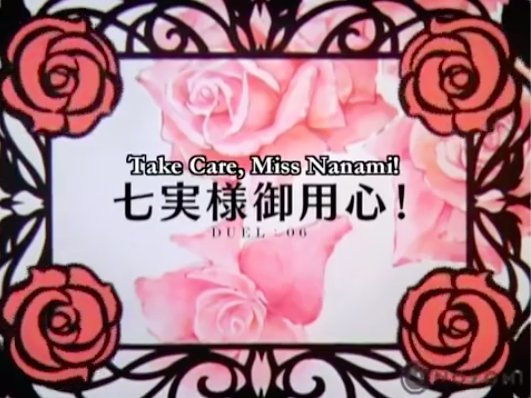
finally, one of the weird ones.
something i distinctly remember from my first pass at utena was the presence of the "other" episodes, where the romance and psychodrama fall away in favor of some extremely different tones, either humorous or surreal (or both, usually). watching this episode now, i feel like i better understand why they included chu-chu, or at least how humor fits into the show's world. as much as the story has a strong narrative and character bend, it also revolves around a core of mundane and amplified emotions. just there are small dramas of friendships and school grades, there are also grand dramas of swordfights and the end of the world. why not some light comic relief from a purple mouse contrasting with a series of runaway killer animals?
nanami has slowly taken a more and more central role within the show, starting with miki's arc and now taking the stage for an entire episode. more and more the show feels like an ensemble cast, with utena and anthy often following the action in small, adjacent roles. it also feels as if the central character sets the episode's tone - miki's arc felt fairly similar to the usual sensibilities due to his mirroring of utena, but there were little touches here and there that seemed unique to him (such as the short piano figure that plays when he looks at anthy, or the gold-washed memories of the garden). in nanami's case, touga spells it out, saying, "i think you shouldn't read so many detective novels."
the first half of the episode couldn't be more pulpy - nanami walks home alone at night, pursued by a shadowy figure and almost struck by the blinding lights of a passing car in a dark tunnel, touga seems to be enlisting anthy to plot against his own sister - and all of it seems to be colored in by nanami's warped perspective. she says she's afraid, and she is - afraid of losing her brother, who miki describes as "the only man she really wants." leaving aside the brocon allegations, there's a real pain to nanami that shows in so many ways - how she hurts people around her, how she uses others to avoid dealing with anything directly, and how her vivid imagination brings her worst fears to life. utena is swept up for the ride at first, but is able to see reason once anthy reveals the real nature of the conversation - as usual, utena remains grounded and true.
suddenly, a horse arrives, continuing nanami's strange theme of being an enemy to all animals. (i do unfortunately remember the origins of this enmity.) a prince appears to rescue her, and suddenly the show returns to its fairy tale visions, showing nanami's rescuer as a silhouette-like figure matching the prince from utena's prelude. and yet, as the show often does when a character parallels utena, the tone twists. nanami's rescuer is an elementary schooler named tsuwabuki, and she begins dating him solely to exploit him as a bodyguard and servant. it's here that utena must take a stand, as the defender of the sanctity of love, and yet her power does not manifest, for she has no one to avenge. as much as nanami is using tsuwabuki, he's using her as well, having created numerous dangerous scenarios to save her from, hoping to act as her protective older brother. of course, no one can replace touga for nanami, so while she appreciates tsuwabuki's services enough to rescue him from the kangaroo, she breaks up with him, and he takes his place as an adoptive younger brother. wait, kangaroo?
there are so many absolutely hilarious moments in this episode, accentuated by excellent direction - the composition and timing of certain shots alone carry an incredible sense of comic rhythm. i'm laughing even now thinking about saionji (saionji???) appearing from nowhere, trying to be profound about his own misdeeds, and then standing there solemnly as utena and miki ignore him in prolonged silence, like a bathos-infused version of the evangelion elevator scene. the shock of his sudden reappearance being immediately neutered by his own romeo-like melodrama is just impeccable. what really strikes me is the density of imagery and gags as well - tsuwabuki crouching under nanami's desk to help her cheat on a test, the interchangeable suzuki, yamada, and tanaka's seemingly-rehearsed appearance (and later harmonizing?? as they prepare to battle a fifth-grader??), nanami's wiretap setup (bringing the episode back to its pulpy beginning to resolve the mystery), the trifecta of loose animals, shirtless touga k.o.'ing a kangaroo - it's beyond belief.
tonally, it could not be farther from the show's resonant scenes of abuse and sorrow, and yet its inclusion doesn't feel haphazard. it's often said that disparate genres like horror and comedy are related - they both seek to provoke an irresistible reaction in the audience, and i think something similar is at work here. typically, the show wrenches the audience emotionally, showing characters in pain and desperate to find salvation, helpless people rescued from cruel fates, all in the name of love and told through rich, imaginative imagery and settings. in their turn, the gags are just as rich, creative, and provocative, stunning the audience with their absurdity and depth of character. it's that deepening that i think strikes me most - taking utena as the lead, her life typically doesn't revolve around the duels and the fate of the world. other than her mysterious prelude, she's mostly a typical high schooler, playing basketball (and baseball) and goofing around with her friends. episodes like this feel like a gentle sweetness in the dish alongside the sour, compelling bite of the drama, each serving to heighten the other. it's a small glimpse of the bright side, just as over-the-top as the darkness beneath. it helps to have a world worth saving when the apocalypse is on the table.
of course, the allure of the past continues to bind the cast, from nanami's idolization of touga to tsuwabuki's fixation on rescuing nanami from dangerous animals. as comedic as it is in that context, it's yet another instance of a character willing to do anything to reclaim some lost beloved feeling. tsuwabuki's attempts to recreate the scene of nanami's rescue echo with miki's attempts to claim anthy as a partner in music to relive his childhood with his sister. seeing this theme reoccur as character after character struggles to let go of the past, the council's motto of bringing the world revolution feels especially pertinent - the death of the old world for the birth of the new.
stray thoughts:
incredibly excited for the next episode, which centers the mysterious juri.
it's no secret that this show was a big influence on rebecca sugar during the development of steven universe (and the allusions are especially apparent in-text), and the surreal humor of an episode like this feels just as influential as the high drama, romance, and iconograpy.
i'll be interested to see how the show handles the relationships between utena and her challengers after their defeats - saionji seems to be more of an annoyance than a threat at this point, while miki, who was more misguided than truly ill-intentioned, has seemed to become a close friend. somehow i suspect juri will follow a new path here.
4 notes
·
View notes
Text
Today's film is The Unbearable Weight of Massive Talent. To see if the "nic cage film subversion" applied.
I'll be honest. It felt wrong. Subverting the Nic Cage film or character archetype is one thing, riffing off the real man's life was too uncanny. Actors have pulled off cameos as a version of themselves but a whole film felt oddly... exploitative. I mean, I don't exactly feel strongly about it like the way true crime media has me foaming at the mouth about revictimization or bad biopics flatten a life into a hero's journey. Nevertheless, the real life fact is Cage made a bunch of stupid purchases during a career low and then had to take a bunch of films he didn't care for to repay his debts instead of doing his usual one for work, one for the art. In 2022, he was solvent again and able to choose passion projects. It's hardly tragic compared to your average worker's dilemmas and yet, having a meta film made about your bad choices still has a cringey taste to it.
Pedro Pascal is not well served by the script or the tone shifts, he pulls off being a genuine man and fan but he's not given anything to flesh that out or add dimension to what could have been an interesting character torn between his own ethics and his family. As for Cage the character, he's a cartoon and part of me is glad he stayed that way and cage didn't offer up any personal information or anecdotes to make the caricature more legit. He played it like a stranger unwilling to dive deep into this cartoon cage. Tied to his philosophy of not wanting to taint your experience of a film with his beliefs or personal life. I guess that's part of the uncannyness : the man who won't tell you about his faith so you won't view a film about faith any differently is having to make a film about a fictional version of himself based on a bunch of things he probably wishes he could debunk.
The bromance was sold well but the story was not credible and neither actor got to show their range. Neil Patrick Harris as the manager breaks immersion in the story everytime you see him, Tiffany Haddish to a certain extent too. They could have pulled this off with unknown faces and fully leaning into a different genre like dark comedy or surrealism. I think a less "accessible" film with a more trippy vision and reflections on the public performance as a similar performance to movies could have been a cult hit. I recommend looking up nic cage interviewed terry wogan where they both are on cocaine but Cage is totally off his gourd for a taste of what it feels like to watch a man perform himself.
6 notes
·
View notes
Text
2022 Year End Compilation
The Ancient Minstrel, Jim Harrison
Hm. A meandering, unfocused disappointment. In the introduction Harrison admitted that he surrendered to fictionalizing his autobiography. I wish he hadn’t. His fictitious flourishes only detract from his usually gorgeous prose.
Eggs, Jim Harrison
Hmmm! Considerably drier than I expected. It feels like he abandoned his usual poetic prose in favor of a more traditional―dare I say Russian―psychological study. The result is surprisingly staid.
The Case of the Howling Buddhas, Jim Harrison
HMMM!!! This was dreadful. Harrison has never been embarrassed by sex, but this novella feels like he wrote it with his penis.
Brida, Paulo Coelho
I have no idea if the magical system Coelho presents here is his own invention or not, but personally I don’t really care. I adored this book and its bizarre yet gentle syncretism of paganism and Christianity. I know many find Coelho’s books unbearably twee, but so far all the ones I’ve read have hit the sweet spot between sentimentality and sincerity.
Undermajordomo Minor, Patrick deWitt
At a certain point this book started to feel like deWitt wrote it solely to surprise and outguess himself. That’s the only explanation I can think of for a book that takes so many surreal and thematically nonsensical turns. I enjoyed a good deal of it, but I can’t help but wish deWitt had settled it all on a central point or two. That said, I’m not sure I’ll ever be able to forget the most bizarre secret aristocratic orgy this side of Eyes Wide Shut.
The Running Man, Stephen King [as Richard Bachman]
Deliciously, succulently furious. I had no idea King had this kind of fury in him. It made an already lean thriller absolutely propulsive. This was the pulpy palate cleanser I’ve been looking for for a long, long time.
The Far Cry, Fredric Brown
This was...very much not what I was expecting. When I picked this book up, I expected a decently entertaining crime thriller. Instead, it’s a slow-burn psychological drama of a man investigating a murder and becoming obsessed with the dead victim. So much of it predicts Alfred Hitchcock’s Vertigo. The first chunk of the book is a bit dry, but once the obsession begins to really take hold of the protagonist it becomes quite engaging.
Reality Check, Peter Abrahams
Apparently, this book won a Young Adult literary award when it was published. All I can say is that if books this dull were considered industry exemplars at the time, then losing an entire generation of young readers to Twilight and dystopian death games suddenly makes much more sense.
Roadwork, Stephen King [as Richard Bachman]
This book makes an interesting counterpoint with Pet Sematary: both films are, in their own ways, about dealing with grief. But whereas Sematary reacts passively with resignation, Roadwork reacts actively with rage. It’s a bit bloated, but the whole thing still vibrates with the anger that makes King’s Bachman books so compelling.
Fever 1793, Laurie Halse Anderson
A brisk and snappy work of young adult historical fiction. Would be fascinated to see what this book would’ve been if it’d been written in the shadow of our current pandemic and its plague of misinformation and anti-vaxx sentiment.
The Thing Around Your Neck, Chimamanda Ngozi Adichie
Adichie’s short stories all, in one way or another, see people trapped between the push and pull of different identities and cultures, whether they’re racial, ethnic, or geopolitical. The opening story, the ghastly and sad “Cell One,” even extends this to see a young man incapable of adapting to the us vs. them mentality of prisoners and prisoner guards after getting arrested over suspicions of murder. It’s a fantastic collection of stories, even if all of them don’t hit equal heights. A personal favorite is “Jumping Monkey Hill.” I could’ve easily read a book-length version of that one.
Patrimony: A True Story, Philip Roth
Knowing that I’ll probably go through something similar with my own father, reading this book was like placing my hand on a hot skillet.
A Lost Lady, Willa Cather
The elegiac downfall of a man, a house, a woman, a nation, a myth. Lovely, sad, and rich with Cather’s unmistakable sense of place.
Jesus’ Son, Denis Johnson
“I had a moment’s glory that night, though. I was certain I was here in this world because I couldn’t tolerate any other place.”
The Violent Bear It Away, Flannery O’Connor
Only someone with a devout faith could write a book with such venom towards organized religion.
The Crying of Lot 49, Thomas Pynchon
Perhaps choosing this as my first novel to read while mentally burnt out after finishing a semester of seminary wasn’t the best idea.
Mao II, Don DeLillo
Terrifyingly prescient in its vision of a future where terrorism replaces the written word as the most effective means of mass communication. However, the book itself feels inherently disjointed, even within the context of DeLillo’s usual chronological and POV flourishes. Only the prologue and epilogue at the mass Moonie wedding and the revolutionary unrest in Beirut told from the perspectives of the book’s two central women seem to actually engage with DeLillo’s thesis of “the future belongs to crowds.” The middle clump of the book is mostly—both figuratively and literally—tortured writer porn.
Running Dog, Don DeLillo
Migraine-inducing in its byzantinism. This novel’s first half where it was just a pulpy spy thriller was more fun than the philosophically nihilistic second. The actual content of Hitler’s home movie was a brilliant coup, but it did little to relieve the overall turgidness of the overcomplicated narrative.
A Good Man Is Hard to Find and Other Stories, Flannery O’Connor
An essential Catholic corrective to the current of gloomy Calvinism that infects so much of American literature. The title story, “The River,” and “A Temple of the Holy Ghost” are sad and beautiful while “Good Country People” and “The Displaced Person” are deliciously nasty.
The Magic Barrel, Bernard Malamud
I enjoyed the modern Jewish parables well enough, but the “American Jew in Italy” stories sapped almost all of my enthusiasm out from reading this book.
The Pale King, David Foster Wallace
Somehow, simultaneously, one of the dullest, most thrilling, most banal, and most touching novels I’ve ever read. Wallace delves into the nature of boredom, proving that the ability to navigate mundanity and monotony is just as central to the human experience as the capacity to comprehend beauty. Parts of this novel lodged into my mind like a splinter, none more than the first chapter which might be one of the single most gorgeous pieces of prose in American literature.
A Really Big Lunch: Meditations on Food and Life from the Roving Gourmand, Jim Harrison
Possibly the finest book I’ve ever read about food, eating, the love of both, and how they all inform the act of living as a bodily human being. You can taste the marrow in this book’s bones.
The Book of Daniel, E. L. Doctorow
The fact that Julius and Ethel Rosenberg were later proven guilty as sin by declassified Soviet documents does nothing to lessen this book as a chilling portrait of how America scapegoats and lynches its poor, dispossessed, and racially marginalized. Also, I could read Doctorow’s descriptions of NYC crowds, streets, neighborhoods, and markets forever.
Homer & Langley, E. L. Doctorow
Oh, how I wish Doctorow had stretched his imaginary history of the Collyer brothers to include 9/11. Also, I feel like Doctorow might have fumbled a possible creative flourish by not revealing that the book itself was a copy of Langley’s fabled newspaper which, upon completion, managed to speculate on the future.
World’s Fair, E. L. Doctorow
Pleasant enough as a childhood autobiography of growing up in early twentieth century New York City, but at times it felt more like Doctorow was writing a laundry list of sense memories than he was the story of his youth. Also, it’s kind of cringy how much of it was recycled from The Book of Daniel.
The Ponder Heart, Eudora Welty
The rare Southern Gothic comedy that’s genuinely clutch-your-side funny, not the sardonic, wince-through-the-tragedy “comedy” of Flannery O’Connor.
Delta Wedding, Eudora Welty
**heavy sigh** You know what this book reminds me of? Those awful late 70s Robert Altman films where he filled his casts with too many damn characters all with barely anything to do.
As I Lay Dying, William Faulkner
As amazing as everyone says it is. I was a Faulkner agnostic after reading The Sound and the Fury which I admired only on a technical level and Light in August which I didn’t like at all. But this novel was a tour de force portrait of Southern decrepitude writ large with the imagery of the Old Testament and the tragedy of the ancient Greeks.
Mexican Gothic, Silvia Moreno-Garcia
Delightfully morbid, thrilling, and disgusting. Was not expecting this book to go in the direction of weird science, but I’m glad it did.
Midnight’s Children, Salman Rushdie
It was around the halfway point of this book—right when Saleem and Shiva were about to meet for the first time—that I heard the news that Salman Rushdie had been attacked and stabbed in New York. What a testament for how little has truly changed since his literary career started.
A Portrait of the Artist as a Young Man, James Joyce
Statler: “What was this book called again? A Portrait of the Artist as a Young Man?”
Waldorf: “More like Portrait of the Reader as Bored Senseless!”
Both: “D’oh-ho-ho-ho!!”
2 notes
·
View notes
Note
Thoughts on Esme?
I have them.
To start with, I see Esme quite differently from the way this fandom appears to see her, yet also quite differently from the way Meyer intended for me to see her.
I think we all on this website have noticed that fandom has morphed Esme into a very different character than the one we met in the books.
Now, some people take this further than others, and it’s gotten to a point where I can’t tell if fandom believes this new and shinier Esme is canon, or if they know she isn’t canon but don’t care. Either way, the common denominator to all variations of fanon Esme is that this fandom is sick of the way Stephenie Meyer writes women, and see Esme as the worst affected by all. And fanon Esme is a vindication, one where Esme is an assertive, intelligent, feminist woman with a fantastic sex life and an impressive career. The ideal American woman of the 21st century.
And to each their own - if this makes people happy, then by all means. This meta is my personal opinion on her, though, and since fanon Esme has gained such a strong foothold in fandom I would be amiss not to bring her up.
Another thing I’d be amiss not to bring up is movie Esme. The Esme portrayed in the movies is, like so many of the characters, a different person than the one in the books. She is charming, warm, appears to have no difficulty controlling herself, and off the top of my head I can think of one time where she’s given what was originally Carlisle’s moment. I’m talking about sparing Bree - in the books this is something only Carlisle would do, something that has the others going, “jeez, Carlisle, only you”. In the film, this is a decision he and Esme make as a couple. This changes both their characters.
So, these versions of Esme exist, and they’re good characters, but they’re not the Esme I see in the books.
What we meet in canon is a woman who contents herself with being a 50’s housewife. No one in the house eats, she still knows how to cook. Making beautiful homes and keeping them beautiful is not just her passion, it appears to be all she wants to do. Now, humans can be housewives, and that’s a choice I respect very much, but Esme is a vampire, living in a vampire coven. The Cullens have zero need for a housewives. And she doesn’t do other things, either. There is only the creation of homes and being a mother.
And so Esme floats through eternity, embodying the Mother archetype, going through all the motions mothers do with no deeper meaning to any of it.
She gives me the creeps.
I don’t know if anyone here has read Coraline, but in that book we meet the Other Mother. Other Mother always has time for Coraline, she makes all the delicious food Coraline could ever want, and loves her very much. The cat tells us that this may be, Other Mother may love Coraline, but it could also just be she wants to eat her. And since Bella does end up sowing buttons into her eyes, I can’t shake the association.
I think the Esme Platt who ran away to fend for herself and her child, who got a job and struggled to be independent, died with her child. This was her last tie to hope, to this world, and with his death she gave up on life in a way nothing could meaningfully recall.
She then wakes up as a vampire, beautiful (I’m guessing here, but one of the most common things men like to insult women is by demeaning our appearance. An abusive husband, living with Esme in a time where a woman’s appearance decided her worth even more than it does today, would definitely use this against her. Not to mention, it is a cornerstone in female socialization that we’re taught to value our looks. Becoming inhumanly beautiful would boost anybody’s spirits and install confidence, and I doubt Esme was an exception), stronger and faster than any human man, invulnerable, powerful in a way she never dreamed she could be.
The man she idolized since she was a child, who was supposed to be an unattainable dream, is there, and even more wonderful than she remembered. He’s the one who saved her, and within the year he becomes her husband.
(This by itself is too fantastical, too storybook ending, and I imagine snapped whatever remaining strings Esme still had tethering her to sanity. Any newborn vampire would find themselves in a surreal new state of being, but this is a step further. There’s getting to have it all, and then there’s... well, then there’s this.)
Then there is Edward. Days after she lost her son, she’s presented with a young man who lost his mother.
(And this might be a post of its own, but: we never see Esme be a mother to any of the other Cullens, and I don’t think she is. It’s just Edward. And she loves him all the more for it. She wouldn’t blink at Bella dying if Edward decided his thirst weighed heavier than his fascination with the human. This is canon - they have a conversation about this, and Esme make her stance clear. She puts Edward above absolutely everything else in this world.)
What I’m getting at here, is that Esme was handed perfection on a silver platter. All the things she’d lost, all the things she’d lacked, things that had been taken from her in the cruelest manner possible, were now given to her, in perfect condition at that. Esme will never have to worry about things like money, sickness, aging, or even Edward growing up and leaving the nest. (And even when he does get married and have a baby, he still doesn’t leave the nest!)
Esme was given the ultimate do-over with vampirism, and she spends it being what she never got to be in life. (And I’ll link this post, because Bella’s in the same situation, if less extreme, and they’re both in for a rude awakening. And I don’t think Esme will cope at all.)
To Esme, vampirism is startlingly similar to the afterlife. It’s her tailored paradise, eternal and perfect. There’s the fact that every so often she slips up and eats people, but that only adds to the eeriness of it all.
Esme Cullen is more a ghost story than a vampire to me, haunting whichever house the Cullens inhabit under the guise of being a homebody.
(As for the her supposed sex life with Carlisle - Meyer said they have a spiritual relationship. That’s hilarious, and code for they’re not having sex.)
#there's something very appropriate about this woman looking like she stepped out of a fairytale#snow white in the flesh#and snow white fell into a death-like sleep#only for esme when the prince kisses her something else wakes up#esme cullen#carlisle cullen#edward cullen#carlisle/esme#twilight meta#twilight renaissance#this is the part where my blog gets controversial#carlisle what the fuck did you marry#Anonymous#ask
1K notes
·
View notes
Note
is there any like guide or something as to what's yaki vs ayano? because even trying my best to pay attention to little details I still get confused and can't tell who exists when and where
(Note: Answering this OoC. Also for the purposes of this post I will be referring to Shintaro's "Snake of Retaining Eyes" by the general fan name "Yaki" for simplicity/recognizability, and "Ayano" as all other incarnations.)
@yoomster wrote a semi-related summary which may answer your question to a degree somewhat. If you haven't yet read up to chapter 70 of the manga, then I definitely also recommend doing so in order to gain a better understanding of Yaki's background. To delve deeper into the details of her current persona and role in the story, a base guideline to go by in any given scene is if "Ayano" is either...
a. acting creepy and spouting cryptic messages (especially about "remembering/not forgetting")
and/or
b. alone in a classroom setting with Shintaro
...then chances are it's Yaki. The exception to the second category would seem to be the ending of MCA ep11, where Shintaro goes directly into the Daze to rescue the Ayano of that timeline, who committed "suicide" to enter the Daze so she could possess a pair of red eyes and prevent "Clearing Eyes" from enacting his plan by gathering all the snakes. For what I suspect are deliberately misleading meta reasons, Ayano's individual section of the Daze closely resembles Shintaro's typical "mind palace" by taking on the appearance of a classroom too. I say "typically" because according to MCA, Shintaro's mental/dream conversations with Yaki don't always take place inside a classroom - but sometimes more surreal spaces such as the area filled with gears at the beginning of Act 01, or the hourglass carousel at the start of Act 05. Granted, this could all be chalked up to SHAFT's stylized presentation, but generally these instances are implied to be Yaki as well.

There is one other curious case from MCA in question, which @fuckyeahkagepro made a post on pointing out the similarities to a short segment from the third novel. (Please note: The subs in the vid are likely inaccurate, though it’s hard to tell without full context given the ambiguity of the original syntax. I have consulted with a friend of mine who studies Japanese and confirmed that - judging by tone, grammar, and vocabulary choice - the most probable meaning of the line “So you ended up being you” should instead lean approximately towards “It turned out to be you”, or as MekaMekaSubs’ group corroborates: “So it was you, after all.” This not-so subtle distinction will be important to a hypothesis I have later on.)
Here, we see a mysterious "Ayano" interacting with Hibiya of all people (whereas the speakers' identities were left unknown in the novel version). Previously, one might've assumed Ayano crossed paths with Hibiya while they were both inside the Daze, however based on the novel transcript along with new information from the manga I have a different theory. In the novel, it's stated that the way Hibiya's "Focusing Eyes" works is that he can "see through the eyes of other people". I believe that upon obtaining the Focusing ability, Hibiya is able to actually access Shintaro's sight to be able to communicate directly with Yaki, making him the only other Dan member capable of doing so - albeit rarely/unwittingly. (Potentially Seto could too if he knew/tried? Hm...)
Other evidence to back this up exists in the excerpt: For one, Yaki is a lot more knowledgeable about the situation as a whole compared to Ayano due to having memories of past timelines, and her remarking "So it turned out to be you" indicates she's aware Hibiya is not always the one to receive "Focusing Eyes", as Hiyori did instead in the manga’s second route. "I have explained this to you before" also matches up with Yaki having openly informed Hibiya specifically about the origin of the Kagerou Daze and their red eyes in the manga (whilst still a human then utilizing "Favoring Eyes" throughout Volume 7). There's been no sign to suggest MCA route's Ayano has ever met Hibiya in the past, or that she can even leave her designated Daze quarter, so my money's on it being Yaki instead. (Why they're standing on telephone poles in the water IDK, but it's probably just SHAFT being artsy-fartsy again.)

As a disclaimer, I've not read the novels themselves beyond the first English volume + scattered synopses, and am only speculating conjecture based on an out-of-context unofficial translation. (If anyone has the official rendition of the Kagerou Daze IV chapter from The Children Reason LN - or better yet, knows where to find to the raw Japanese text so I could ask my friend to double-check that as well if only for my own peace of mind, I’d appreciate it.) To that topic though, there is one other incident I'm aware of in the novels that seems pretty plainly hinted to be Yaki foreshadowing in hindsight...
For the record, chapters 69 and 70 of the manga also completely recontextualize the Lost Time Memory PV (and by extension MCA 08's ED). Given the clear references to LTM's imagery in the manga, I think it's safe to assume the "Ayano" in LTM's classroom is in fact Yaki, and not Ayano passing on her eye power to Shintaro in the Daze as was once postulated. (Presumably Jin had a lot more creative control over the manga than the animé, so the panel-to-PV parallels are definitely intentional.) This is emphasized further by LTM's Yaki literally disappearing at the end of the PV, which in chapter 70′s “Additional Memory” epilogue Yaki outright states will happen to her once the "world stops looping", i.e. the "wish" to save everyone is fulfilled. ;(

On that note, Additional Memory's PV is a bit of a mixed bag, since it contains visuals and lyrics applicable to both Ayano and Yaki. I'm inclined to consider the song as simply a bridge between the two, which can be interpreted through either lens depending on the listener.
Again, bear in mind this is all just purely my personal analysis of the events provided by canon so far, so take it with a grain of salt. If anyone spots that I'm wrong/misinformed about anything please feel free to correct me (or just let me know your own takes, I'd love to hear 'em). Hope this helps!
#anonymous#Tateyama Ayano#Yakitsukeru#Kagerou Project#Mekakucity Actors#Kagerou Daze#modspeaks#long post#been a while since I did a deep dive into Kagepro theory eyyy#FYI in terms of fanart I tend to count any depicting Ayano in her white dress as possibly 'Ayaki'#which is why you'll see me reblog a lot of it#apologies for other asks still waiting on answers in my inbox btw#some are repeats tho there is one I'd like to respond to#just not sure how yet
61 notes
·
View notes
Text
spike, angel, buffy & romanticism: part 2
part 1: “When you kiss me I want to die”: Angel and the high school seasons
*
“Love isn’t brains, children”: Enter Spike as the id
For all that I’ve just discussed all of the ways that the first three seasons subvert the romance of Angel, it’s also true that the writing still fundamentally takes him—and Buffy’s relationship with him—seriously. To some degree it has to. Because Buffy is the show’s emotional anchor, if the writing didn’t take her emotions seriously, the audience wouldn’t either. It needs to be sympathetic to her (regardless of whether it endorses her, per se), or else it would run the risk of losing all pathos. Making fun of Buffy and Angel makes for a great gag in “The Zeppo”, and fits with the general way that season three undermines the romanticism of them, but if that was the show’s attitude the whole way through, it would come off as simply meanspirited. It would seem like it was making fun of Buffy for being a stupid teenage girl in love, instead of sympathetically depicting the human experience of being caught up in big, tempestuous emotions.
But at the same time, if the writing were to only take romance seriously, that wouldn’t feel very true either. Or fit with the general Buffy ethos, which loves to flip between serious and silly moods in order to capture all sides of whatever it’s exploring. And therein is the magic of Spike’s addition to the chemistry of the show. Practically from his introduction, Spike parallels Buffy’s romantic storylines, except unlike Buffy, Spike is allowed to do the comic or morally incorrect thing. His status as a soulless vampire means that the show is free to use him to point out both the sillier and darker sides of romance, without tainting Buffy’s heroism or the seriousness of her emotions.
In “Becoming, Part 2” for example, Spike is free to explicitly say that he’s saving the world because he wants Dru back, and leaves Buffy to die once he’s gotten her. Whereas Buffy, despite also wanting the person she loves back, ultimately chooses to save the world rather than keep him. Spike allows the episode to show what Buffy’s, or anyone’s, romantic id might want, without Buffy herself going through with it. He also allows the episode to show the ridiculousness of the romantic id, by giving him comic moments like “Didn’t say I wouldn’t”, or “God, he’s going to kill her”, or beating Angel with a tire iron, or any of the times that Buffy makes fun of him (“The whole earth may be sucked into hell and you want my help ‘cause your girlfriend’s a big ho?”). All of which is in contrast to the tragic seriousness of Buffy’s heartbreak. Spike in season two is not a character without pathos; in fact, he has quite a lot of pathos that parallels Buffy’s--think of the tortured close-up on his face as Angel and Drusilla taunt him in “I Only Have Eyes For You.” But neither is he limited or defined by that pathos.
He plays a similar role in both “Lovers Walk” and “The Harsh Light of Day”. In “Lovers Walk” he’s devastated by the loss of Drusilla, as Buffy was devastated over Angel in “Anne”, yet the way they get out of their respective depressions is very different. Tonally, “Anne” plays Buffy’s misery extremely straight, and when Buffy decides to stop moping and become an agent in her own life again, her version of “agency” means getting in touch with her leadership and heroism. Whereas for Spike, agency means a love spell, or torturing Drusilla into liking him again. The romantic id tries to re-possess the object of its desire, whereas the ego or superego is able to set that desire aside, whether or not it wants to. More obviously, Spike in “Lovers Walk” parallels all of the other characters and their romantic situations. All of them are behaving somewhat selfishly or self-destructively in their love lives (Xander and Willow cheating, Buffy and Angel torturing themselves with friendship) but are in denial about the fact that they’re doing so. And then Spike blazes in with his version of love that is selfish, scary, grandiose, charming, pathetic, genuine, and absurd by turns—and suddenly, everyone’s romantic weaknesses are out in the open. It makes perfect sense that Spike finishes the episode gleeful and optimistic, because “Lovers Walk” as a whole represents a triumph of the romantic id over the romantic ego, if only temporarily. And it’s all handled with a brilliantly whiplash-y mix of comedy and tragedy because at the end of the day, the power of the romantic id really is ridiculous. The way that Spike turns on a dime between being scary and pathetic parallels the way it’s at once absurd, and kind of frightening, that your id would make you, say: cheat on your wonderful high school boyfriend, just to have a chance with your childhood crush.
Because Spike is often treated as the show’s romantic id, the writing’s relationship to his romanticism gets complicated. Like Angel, there is something romantic in his aesthetic and behavior, even if he doesn’t look like Angel’s conventional Byronic hero. He wears a long, dramatic coat, poses rebelliously with his cigarettes, and dotes on his paramour with the elaborate attentiveness of Gomez Addams. But unlike Angel, he is not just a romantic symbol or object, he is also a romantic subject. That is to say, Spike’s romantic storylines tend to emphasize his romantic desires, and use those desires as motivation. By contrast, Angel’s storylines don’t really have much to do with whether he’s “gotten” Buffy or not—instead they have to do with whether Buffy has gotten him. The fact that Buffy and Spike are both treated as romantic agents in this way is a key indication that the two characters are meant to parallel each other. Angel’s side of the Buffy/Angel romantic storyline has to do with whether he can control himself around Buffy, whereas Buffy’s has to do with whether he likes her or wants to be with her. Similarly, Spike’s romantic storylines hinge on the status of whether Drusilla or Buffy want him.
Not only is Spike a subject when it comes to romantic relationships, he’s also a subject when it comes to Romantic thinking. He is a character practically defined by his romanticism. He aspires to romantic things, and therefore can be used to poke at romantic outlooks. Despite his grand love for Drusilla for instance, she still cheats on him, and he still has to knock her out, do a love spell, or torture her to get her back. Or he’ll make grand pronouncements that are immediately followed by things like getting tasered by the Initiative or falling into an open grave. Because of this, Spike is able to parallel Buffy’s Romantic thinking as well, not just her romantic desires. Notice how in “The Freshman”, when Buffy is feeling out of touch with her Romantic Slayer self, that she has a scene where she’s treated like Spike--she delivers a dramatic threat and then falls through a ceiling. Or in “Some Assembly Required” when she obeys her id and hotly demands that Angel listen to her, she falls into an open grave. This kind of comedy has a lot in common with the deadpan Angel humor discussed in the last section, but notice that the target of that humor is Angel’s romantic objecthood rather than an outlook Angel has. Angel’s role, when it comes to romanticism, has to do with how Buffy and the audience sees him, whereas Spike’s role (at least in the early seasons) has to do with how Spike sees, period.
The show doesn’t just poke at Spike’s outlook though, it also uses him to poke at other people’s romanticism. In season two, for example, Spike is the one who gets impatient with Angel’s grandstanding, sarcastically explaining that “we do still kill people, you know” and “it’s a big rock.” In “Lovers Walk” he’s the one who cuts through Buffy and Angel’s drama, reducing it to “googly eyes” with a dismissive handwave (while also building it up in his projection-y “you’ll never be friends” speech). In “Something Blue” he points out that Willow is barely holding it together. In “Pangs” he’s the one who brings the debate over the Chumash nihilistically back down to earth, and in “The Yoko Factor” he schools Adam on Yoko not really splitting the Beatles apart. In other words, Spike attempts to see both the romance and the reality of things. He is the avatar of both, which I would argue makes complete sense, because in many ways romance and reality are really two sides of the same coin. Poetry and stories are fake and bigger than life, but you use them to tell truths. But being the id, his point of view can be hypocritical and biased as much as insightful, just like anyone’s gut reactions and poetic notions can be. After all, you can use poetry to tell lies, too.
Lastly, on a meta level, there is a tackiness to Spike that undermines his romantic qualities better than making him dangerous ever could. Spike likes Passions and Dawson’s Creek (in contrast to Angel reading La Nausée by firelight). He lives in a crypt, but the vibe is more “homeless” than “Dracula” (in contrast to Angel’s tastefully decorated apartment). Spike may act like a romantic, but what does it say about how romantic romanticism really is, that the romantic things he likes can be so unrefined? And with the chip, he’s rendered impotent and pathetic. To me, there’s no more perfect image of how the writing uses Spike than the image of him in his black coat, red shirt, and big, leather boots, blasted under the fluorescent light of his Initiative cell. Light that makes his aesthetic seem suddenly fake and silly and surreal. For all that the writing subverts Angel, he is still the kind of character who gets to disappear mysteriously into the shadows, because he is the romance that Buffy has been forced to abandon. Whereas Spike is left with no place to hide.
If Angel represented the idea of binaries, then Spike represents the lack of them. There is a reason that Spike invites so many queer readings. He is a vampire, but he loves. He is an object, but he’s a subject. He tells the truth, but he lies. He is a villain, but he is a hero. He is masculine, but he is feminine. He is insightful, but he’s a fool. He is pathetic, but he is sympathetic. He is on the outside of the Scoobies, but he is on the inside. These aspects of him are not split between different personas, but exist within him simultaneously. It is telling that the show introduces human, mythos-bending vampires like Spike and Dru in a season about disillusionment, and it is telling that Spike’s role in the show becomes ascendant in the seasons after Buffy leaves Angel and his split personality behind. As Buffy begins to reckon more deeply with her id, and her dualities, she will begin to reckon with Spike.
part 3: “Something effulgent”: Season five and the construction of Spike the romantic
147 notes
·
View notes
Text
IOTA Reviews: Guiltrip
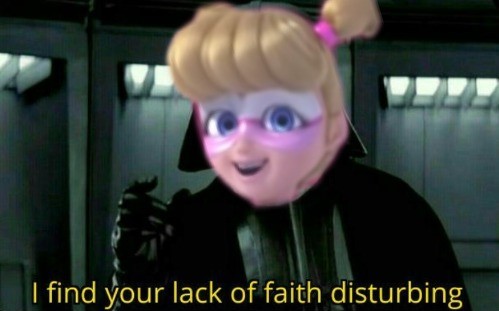
So, my week has been hell. In addition to working night and day on final essays for my classes, I've been really busy at work lately, and the second COVID vaccine shot really took a lot out of me this week. And that's not even getting into the bureaucratic nonsense that comes with applying for the MTEL which is slowly making me wonder if I actually want to teach in the first place.
But, despite all that, there was a single light of hope this week that almost made it all worth it.
STAR WARS: THE BAD BATCH, BABY!
OH MY GOD, THIS SHOW IS AMAZING! I ALWAYS LOVED THE CLONE-CENTRIC EPISODES OF THE CLONE WARS, AND NOW WE GET AN ENTIRE SHOW ABOUT AN ELITE TEAM OF THEM? KICKASS! AND IT TAKES PLACE AFTER ORDER 66 WITH GRAND MOFF TARKIN AS THE MAIN VILLAIN? SWEET MOTHER OF GEORGE LUCAS, I CAN'T WAIT! I DON'T EVEN CARE THAT THEY TRADED IN THE COOL SNIPER CLONE FOR SOME LITTLE GIRL CLONE, I ALREADY WANT TO SEE MORE THAN THE TWO EPISODES WE GOT SO FAR! GOD, I LOVE THIS SHOW!
Oh yeah, there was also a new episode of Miraculous Ladybug that aired on the same day too, I guess. It was pretty good. Hell of a lot better than the past three episodes I've sat through.
Let's get into the fifth (chronologically the eleventh) episode of Miraculous Ladybug's fourth season: Guiltrip
We start off in the middle of class where we see Marinette looking at Adrien lovingly.

Because the writers are still trying to push the Love Square on us as if they were trying to sell us some death sticks. And yes, expect a few Star Wars jokes in this review. This episode did premiere on May 4th after all.
Rose suddenly gets a headache, and asks to go to the nurse, saying that “Miss Dora” is back. While walking there with Marinette, she explains that it's a code name she gives when her head hurts and can tell Miss Bustier without letting everyone know. She probably felt a name like “Maya Grain” would just give it away.
At lunch, Juleka gets a text that really upsets her, so Marinette tries to cheer her up. Keyword being “tries”.
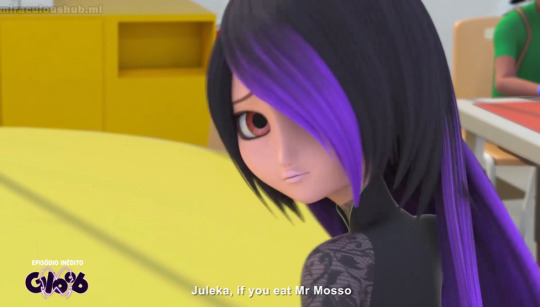
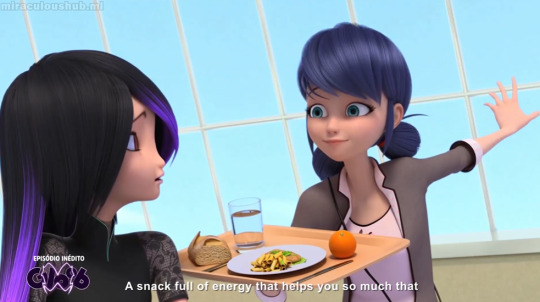

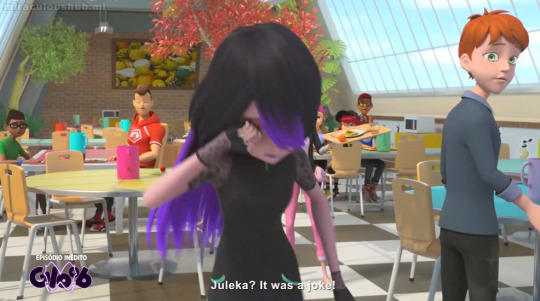
Okay, yes, this is referencing the previous scene, where Rose refers to a certain snack at the nurse's office she eats to recover her health whenever “Miss Dora” visits called “Mr. Coffee”, but it's just bad timing. I get Marinette has a habit of not reading the room, but why did she have to use the term “Miss Dora” when she knows what it's being used for? Sure, she doesn't know that Juleka knows, but did she really have to say “Miss Dora”? She couldn't have used any other name instead? It's like making a chemotherapy joke when you just found out someone close to you has cancer. Even putting the context aside, what is this joke's punchline supposed to be? That “Miss Dora” will visit Juleka if she eats her lunch? Even by the humor standards of this show, the joke fails spectacularly.
Marinette bumps into Adrien, and although she stutters a little with a little exaggerated body movement, she does manage to take things seriously so she can have an actual conversation with Adrien about Juleka, who wants to be alone. She explains that the text she got was from Rose, who was sent to the hospital because of her sickness, and the entire class finds out because Marinette texted everyone to come to check on Juleka.
Goddamn it, Marinette. I usually defend you for getting screwed over by the writing, but you really aren't on your A game today.
Juleka explains that Rose got this sickness when she was little, which naturally worried everyone else. To make things worse, Juleka also says Rose made her swear to not tell anyone about her to worry her. Everyone else swears to not let Rose know that they know, and the act of support is actually enough to drive away an Akuma targeted at Juleka.
Unfortunately, nobody ever said anything about being overly affectionate to Rose, so everyone in the class tries to do things for Rose like carry her bags, giving her a pillow to sit on in school, helping her take notes, letting her cut in line at lunch, and giving her apples.


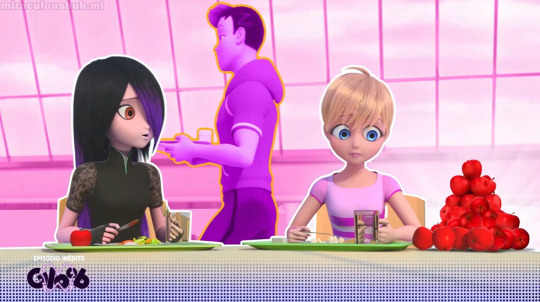

All of this makes Juleka remorsefully tell Rose that she told everyone else, which worries her because she hates all the special treatment, so she goes to tell them all about her illness. While they seem to accept her, the next time she sneezes, they overreact like, uh... how can I make this joke in a tasteful way?
Rose says she's had enough with all the treatment, which makes Juleka feel guilty. In the bathroom, she gets akumatized into Reflekta (yet again) with a Sentimonster named Guiltrip. And then Reflekta immediately gets sucked into the Sentimonster, which will cause it to go out of control. Nice job, Shadowmoth.
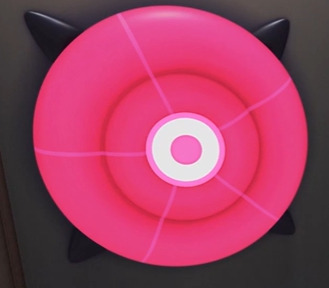
While it might not look like much, this is easily my favorite Sentimonster by far. Granted, that's not saying much, given all we've gotten so far for Sentimonsters is bootleg Mothra, sentient candy, a robotic doll, a frog with a body count, yet another evil doppelganger, and an eye, but my point still stands. Rather than actually confront the heroes, it's basically a portal to another world where it can trap people in bubbles that represent their regrets and despair, and turn them into copies of Reflekta.

It's a really strong metaphor which reminds me of the villains from Kamen Rider Wizard, who tried to drive their victims to despair in order to turn them into monsters. Ironically, that show's main villain is also some asshole in white who was risking countless lives just to save someone close to him. In general, the area inside of Guiltrip is visually stunning, and easily the highlight of the episode. It's just so surreal, and it really sets the tone the episode's going for.
Ladybug and Cat Noir arrive on the scene, and also get sucked into the portal, seeing some of the victims before they also start to fall into despair. And I can't believe I'm saying this, but this is one of the few times where Angstdrien Depreste is thematically appropriate. Cat Noir points out that if they had simply defeated Shadowmoth by now, none of this would be happening, which is a good point. He even attempts to kill himself using his Cataclysm, but unlike RWBY, they don't try to glorify it.
This also leads to Rose managing to fight off Guiltrip's powers with her optimistic personality (so I guess you could say she's A New Hope for the heroes), inspiring Ladybug to compliment Cat Noir. While I'd normally be pissed that this is yet another way to boost his ego, it does fit in with the episode's theme of positive thinking. Well, with the exception of one line where she points out what her time as Ladybug would be like without Cat Noir...

BEING A SUPERHERO IS NOT SUPPOSED TO BE FUN. Yes, there are certain benefits to being a superhero, but it is not a fun game you play when lives are on the line. Why are the writers so dedicated to validate Cat Noir's beliefs that being a hero is just a fun extracurricular activity? Has there ever been a superhero who shares a similar mentality and isn't treated like a complete jackass?
So Ladybug and Cat Noir break free of the bubbles, and after summoning her Lucky Charm, a pickaxe, Ladybug realizes she needs more positivity to break free from Guiltrip. As such, she pulls out the Pig Miraculous and gives it to Rose, who transforms into Pigella. Funny how she forgot her little headache condition when she bangs her head like a death metal singer while transforming.
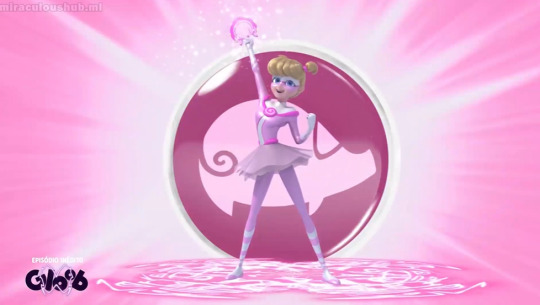
The design is... wait, she's not wearing a skin-tight jumpsuit? She's actually wearing something different?
youtube
Yeah, I really like the Pigella design. There's a good mix of pink and white, and the skirt really brings the whole thing together. It really reflects Rose's optimistic and bubbly personality.
So the three heroes find Reflekta, who has been consumed by tons of bubbles. Pigella uses her superpower, Gift, to show Reflekta what her heart wants the most right now. So it's basically a more specific version of the Fox Miraculous? In fact, what do pigs have to do with optimism?
Whatever reason, it works, which helps Reflekta to break free of Guiltrip's influence, letting Ladybug de-evilize her. But because we need to have a fight scene in this episode, the Reflekta clones start to attack the heroes, but Ladybug uses the pickaxe to climb out of Guiltrip and purify the Amok.
So Rose hands the Pig Miraculous back to Ladybug, and the episode ends with everyone treating Rose normally in class, realizing she isn't as delicate as she thinks she is.
So yeah, I really like this episode. Aside from a few stupid things Marinette said this episode, I honestly don't have a lot of problems with the episode here.
I also really like the lesson this episode is going for. It doesn't shame Rose for rejecting the help, and it doesn't shame the class for being to overprotective of Rose either. It tries to find a middle ground, which is an important lesson to learn, not just for dealing with a loved one who has an illness, but for disabled people and other kinds of situations where someone has a disadvantage. Even as much as I ragged on Marinette for the text, it's clear that she isn't the only one to blame. In fact, nobody really gets blamed for anything this episode. It's more of a misunderstanding, and both sides find a balance on how to treat Rose.
It's overall a really good episode, and the second best one so far this season. And you know what? This episode taught me the importance of staying positive, so with that in mind, maybe I shouldn't be dreading “Queen Banana” when it comes out this week.
Wait, what? It got pushed back two weeks? Oh, THANK GOD! Now I feel like dancing. And I know exactly what song to dance to...
youtube
#immaturity of thomas astruc#iota#miraculous ladybug#miraculous ladybug salt#marinette dupain cheng#ladybug#adrien agreste#cat noir#chat noir#rose lavillant#pigella#gabriel agreste#hawkmoth#hawk moth#shadowmoth#shadow moth#juleka couffaine#reflekta
92 notes
·
View notes
Text
The new and starstudded “A Dream Like A Dream”, is the starting point, not the ending point, of Xiao Zhans
Original Article: https://m.thepaper.cn/newsDetail_forward_12542131
Original Author: 程辉剧场手记
The author published this in Pengpai News and shared on his Weibo Post on 6 May 2021.
Andante Cantabile, my most beloved music by Tchaikovsky, came from his String Quartet No. 1 in D major, every time it would painfully touch my heart, poet Xi Murong also used this to caption a melancholic poem. I thought, using it to sum up Lai Shengchuan’s representative work, “A Dream Like A Dream”, would be most apt.
“A Dream Like A Dream” lasts for 8 hours, this is something rare in Chinese theaters. Using the doctor as the first person, Patient No. 5 recalled and narrated in his narration, a surreal stage arrangement, emotions, life, fate, culture and societal upheaval, bringing tears to fog up your eyes. After 9 years of continued changes in the crew, Yanghua Theater brought in a new version with actors such as Xu Qing, Feng Xianzhen, Ge Xinyi, Xiao Zhan, Yan Nan, Zhang Liang, Huang Lu, Kong Wei, etc. The new version rivaled the quality of its predecessors, but yet bestowed a new presentation and expression.
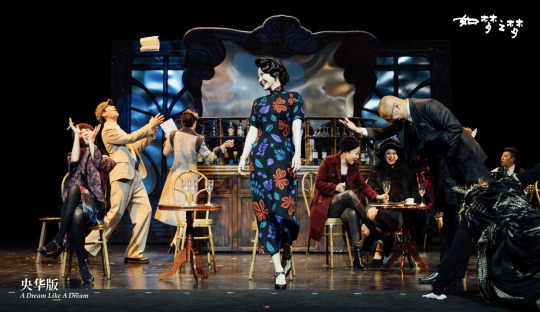
A unique city was the backdrop for its first showing and the chance fate of the characters within the play allowed us to truly understand the nature of impermanence. In the play, there was an important term called “self-exchange”, which was said to come from an ancient practice from South Asia, by “breathing” with the others, so as to gift health and happiness, and remove his pain and misfortune. “A Dream Like A Dream” was a play that spoke of the search for the meaning of life, did it also deliberately “self-exchange” with the audience then? Once we understood the concept of “self-exchange”, we could also see that it was also a request to communicate with the reserved hearts of the contemporary person.
The fates of Gu Xianglan and Patient No. 5 were the two main timelines in “A Dream Like A Dream”, and the other timelines served to supplement or trigger the former. Patient No. 5’s motive came from “searching”, Gu Xianglan’s came from “chasing”. The chaser is the key to enlightening the searcher, the searcher became the resolution for the chaser, although they had different obsessions in their lives, they both came together in the end. Gu Xianglan’s deathbed confession to Patient No. 5 was not simply just an apology in her dazed state, but also her most unforgettable, wonderful and romantic memories of love; Patient No. 5, with his concern, consideration and inquiries, was like the listener from heaven, the guiding light to aid the soul in letting go of her regrets.
The 2021 Yanghua version of “A Dream Like A Dream” maintained its previous feature of multiple actors to one role, and multiple roles to one actor. Xu Qing, Feng Xianzhen, Ge Xinyi acted as after going abroad, old age and before going abroad versions of Gu Xianglan respectively. From the “peerless beauty” socialite of the brothels in Shanghai Beach, to the Baroness of a French Ambassador, to an artist, then to a maid, a sweeper of roads and alleys, to the lonely elderly in the hospital, she went through indescribable ups and downs.
Xu Qing had acted as Gu Xianglan since the play’s debut, and in the new version, her portrayal had already been exquisitely refined, the Gu Xianglan in her prime is lovely and graceful, but yet proud and wild, sensitive and emotional, as though Gu Xianglan’s soul had fully occupied her body. In addition to the true to form portrayal of the amorous nature of Gu Xianglan, her performance was exceptionally focused on the details of the silent scenes. When she and Xiao Zhan’s Patient No. 5 gazed at each other, when teary eyes met with clear eyes; from afar it seemed like she was looking at her younger self about to go onto a journey of no return, the resigned helplessness and the restless hope looked at each other; when realizing that the lost Baron had once returned, her astonished and sharp glares of anger; when Wang Debao found the tiny loft she stayed in by chance, her stealing glances were surprised and flustered… They were all full of the character’s aura and emotional tension, and the pain took the audiences by their hearts.
Senior actress Feng Xianzhen’s portrayal of the elderly version of Gu Xianglan was quite different from the version by the previous actress Lu Yan, which allowed the audiences to experience the wonder of plays due to different characterization. Lu Yan’s version was one that remained elegant and proud despite her tribulations, there was more calm and temperance, which would make the audiences respect the tenacity of this legendary lady. Feng Xianzhen’s version was a Gu Xianglan who went to France from Shanghai, and back to Shanghai from France, twice she found freedom and twice she fell. The cruelty of fate had ripped away all of the pretentiousness, the charm of her past had been lost, she was like every ordinary person. She would scheme cigarettes from strangers, curse as she liked with phrases such as “bastard”, “no good-doers in Taiwan”, mock those relatives who came to look after her as those who came for their inheritance. She fully portrayed the effects of her unfortunate life and her bitterness at the world, which made the audiences sigh in sadness.
Facing these two powerful actresses in portraying the same role, Ge Xinyi as the young Gu Xianglan, had a lot of pressure. Her performance was more inclined to a lonely beauty, the purity despite her circumstances, so as to provide a solid motive for the Baron and Wang Debao’s unrestrained infatuation. As a newcomer to the theater, her steady control was not an easy task, and should be praised for it. If she would be more open, layered and flavorful in her portrayal, the characterization would be better. After all, Gu Xianglan was the top courtesan within the midst of love and affairs, and the quiet and calm of a learned lady would be quite different from that.
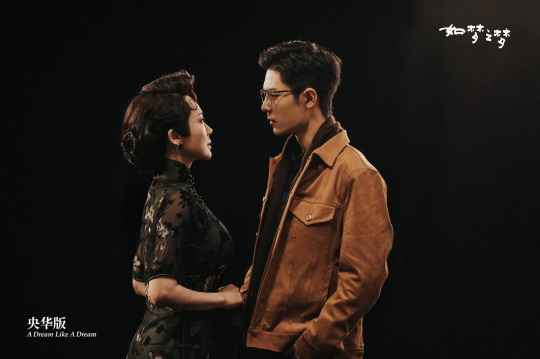
Patient No. 5 was a journeyman of life. In the beginning, he suffered painful setbacks from the death of his child and the loss of his wife, and started a self-exiled wanderlust. His marriage came by mistake, almost like a replacement for his wife’s frustrating relationship. Fate caused him to lose his spirit, but he was unwilling to give up, hence he wanted to search for his wife, as though he wanted to search for himself. His encounter with Jiang Hong, was the wanderers’ sympathy for each other and to rely on each other. Only when he walked into the French castle and saw the tranquil and woeful eyes of Gu Xianglan, he seemed to see himself at the far coast of the lake, the cumulative rage and sorrow in both their hearts, their collective unwillingness to concede suddenly exploded, and he decisively dropped everything to find the lady in the painting. He did not know what question was ignited then, but he started his search for the dream of life.
In terms of the control of this character, Xiao Zhan and Yan Nan definitely put in a lot of efforts, they were highly immersive. What was even more rare was that, although their performances had different focuses, but they were both very united in terms of aura, body language, speech, pace and habitual actions, as though the two actors in the same stage were truly one character. For such a complete creation, you need not only tacit understanding.
Xiao Zhan’s performance exceeded my expectations. Despite it being his debut in a play, his performance was not even the least bit disjointed, and he was even able to merge his own personality characteristics with the role itself. His actions, pace and emotions gave a smooth interplay between tension and relaxation. The portrayal of innocent, naive, youthful, kind and fragile Patient No. 5, his unpreparedness in matters of love, was especially suitable as a youth who just joined society. It made the random encounter in the cinemas as the prelude of love more believable, and also gave a firm foundation to his actions later on, the multiple setbacks in later on, his wanderings, and his endless searching. With his wife and Jiang Hong, he had different relationships, the former was a budding first love, the latter came from empathy, Xiao Zhan had slightly different portrayal for the different phases of space and time, the cycle from simple to confusion, from searching to questioning, there was careful understanding and detailed handling. After discovering Gu Xianglan’s tracks, the clear longing that Xiao Zhan gave off collided with the layered longing from Xu Qing after her tribulations, was like the undercurrents under a calm lake, it drew in the rousing emotions, and became the strong force that pushed the story forward.
Xiao Zhan has the ability and the reason to achieve much better results in future theater stages. With time, if he could become even more at ease with the control of his body, if he could be even more accurate during the changes of character condition, I trust that he could achieve another breakthrough, and create even more challenging characters.
Reprising Patient No. 5 after many years, Yan Nan was obviously even more in-depth with his understanding of the script and character, and gifted the character a melancholy aura similar to those of an ancient poet, the quiet tones and deep glances became the key feature. The sense of accumulation of the vicissitudes, merged with Xiao Zhan’s portrayal, realized the continuation of the character’s fate. His performance on the hospital bed contrasted with Gu Xianglan on her hospital bed in a different time, and manifested Patient No. 5’s enlightenment after his miles of wandering, the person on the bed is awake, but those not were instead still dreaming. His calmness held the strings of every timeline together.
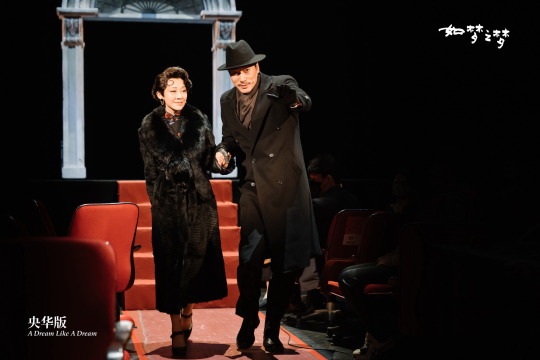
Zhang Liang’s portrayal of the Baron was the surprise of the show. If the old version’s Baron and Gu Xianglan was like the contest between eagle and the wild pigeon, the huge difference in power created the tragedy that made the audiences sad. The 2021 Yanghua version’s Baron and Gu Xianglan was like a pair of heavenly cranes, but they sang different notes as they flew to each other, and became a pair of lovebirds who hurt each other as they fell. The Baron became more romantic, more gentle and loving, but he remained prideful as he was still a noble beneath that amicable exterior, this was Zhang Liang’s new expression to the character, this also elevated Gu Xianglan’s difficulty in her choice, and even more so contrasted Gu Xianglan’s “evil” in her woeful revenge, and also left a branching point to the remaining love. His love for Gu Xianglan was true, it was not possession, but he loved the Oriental beauty, the caged Gu Xianglan, not the wild and free Gu Xianglan. Letting go and abandoning was his hopelessness for his lover, he felt that Gu Xianglan was letting herself go, she was betraying and depraving her beauty, he felt that his efforts were painfully wasted, it was not an attack on an escaped prey. This kind of portrayal made us wonder – love, was it to love a person, or was it to love an ideal? Love was to give or to receive? Was the ultimate goal of giving receiving?
The tragedy between Baron and Gu Xianglan became a tragedy of conflict between culture, social status and ideals. The difference between Baron and Gu Xianglan, did not merely exist on levels of culture and artistic ideals, but it was down to different life goals due to different cultural influences. It was hard for Baron to understand that his love only moved Gu Xianglan from a smaller cage to another bigger cage, even if he loved her deeply; Gu Xianglan who struggled for survival in a twisted environment, simply wanted to escape her cage, even if it meant poverty. This type of tragedy could not simply be explained with the character’s personality. The energy from repeated characterization is evident.
Huang Lu as Jiang Hong was a character that was rather difficult to grasp in “A Dream Like A Dream”. In her portrayal, Jiang Hong was an ordinary girl, who went through multiple troubles but was always chosen, besides her strong sense of survival, I almost could not see more personality. I remembered that I had brief flashes of a parallel universe while cooking eggs one morning, that was the state that she could not find herself or her position in life. She claimed herself as “the original Jiang Hong was dead, the Jiang Hong who arrived in Paris never existed” wanderer, her “relationship” with Patient No. 5 was merely a chance encounter in life, both of them were scared and questioning whether they should “fall into another relationship”. Huang Lu’s performance was very restrained, controlled, and tried hard to make herself not stand out, to do it to this extent was quite difficult. When she was talking about her stowaway escape, there was a point for emotional explosion, but yet she had to control it within the fine line between “surviving the calamity” and “unable to calm herself”. For this actress who was nominated multiple times for international awards and also won a national acting award, this was a rare stage experience.
Kong Wei, who just took off her costume in “Thunder Rain”, portrayed Shi Li Hong, the Mama-san of “Fairy Court”, in “A Dream Like A Dream”. Scheming and cunning in worldly matters, but yet she maintained her own sense of righteousness with Gu Xianglan and her sisters, fleshed out the character with even more emotions. Especially when the drunk professor professed his love for her, her teasing and forced calmness was mixed with surprise and shyness, as every emotion came at the same time, she managed them with ease, not only was the set brightly colored, there was also the sudden exposure of the character’s personality. Wang Peiyu who acted as the young Wang Debao, also showed the character’s clumsiness and stubbornness, his portrayal of passionate love was on point, which was just as brilliant.
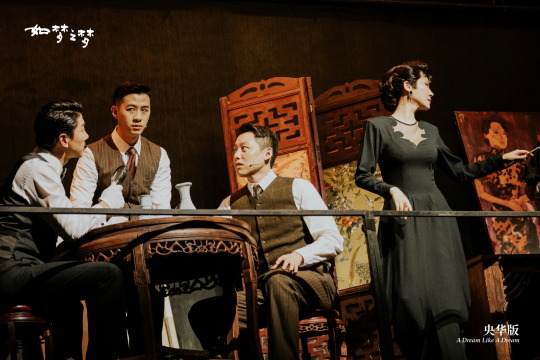
There were many characters in “A Dream Like A Dream”, the group’s shared brilliance could not be forgotten, many actors who acted as multiple roles displayed exceeding energy. This came down to the Yanghua creativity production team, lead by Art Director Wang Keran, who had astute senses in actor selection as well as careful detailing in every part of the creation.
Luo Yongjuan, who portrayed a puppet in “Jewish City” and Li Zonglei, who had many important roles in many dramas and plays, both portrayed over 10 characters, and outstandingly completed the character creation for all of these different roles. Ruan Li, who portrayed the cousin, the dancer, the child, etc, also contributed multiple talents. Wang Weiqian, who portrayed Aunt Jin, the tourist, etc; Sun Zhongyi, who portrayed the professor, the old servant, etc, they all left deep impressions.
To display the characters but not to display themselves, this was the forefront of all theater actors, this was done by Xu Qing and Xiao Zhan, Zhang Liang and other stars, this was the respect they gave the play, the stage, the audience and themselves.
When the first kissing scene appeared for Xiao Zhan, part of the audiences were controlled but there were still some excessive “fan” reactions, but this did not interrupt his performance pace, this reminded me that Xu Qing and Hu Ge version also had the same situation many years ago. We could see that the actors were immersed, they prepared mental homework for every segment and detail, this was the hard work and the goal of both the production and the actors. Putting in efforts into acting and solely seeking the effects of celebrity, these are two totally different things after all.
When rehearsing or refreshing old classic plays, most of the time, methods such as subversion, recreation or simple replay were used. 2021 Yanghua’s version of “A Dream Like A Dream” is a case of production relying on the new cast to continuously discover deeper understandings, to recreate, and then to give audience a new icing on the cake while ensuring the quality of the play.
I was interviewed after the debut showing and said that this play was the Xiao Zhan’s starting point and not his ending point, and I also hoped that more capable actors would come to the theater stage, focus on the creation of art, and from that we could forge our own generation of quality “full celebrities”, such as Jin Shan, Shi Hui, Bai Yang, Zhang Ruifang, Shu Xiuwen, Laurence Olivier, Marlon Brando, Vivien Leigh, etc, of China. On the international theatrical stage, this is just commonplace.
55 notes
·
View notes
Text
lovers’ dreams
Summary: “A day fit for a spring dream.” And then he kisses Roshan, and they become lost in each other.
Characters: India (Aditya), China, Iran/Persia (Roshan, genderfluid). Human names used. Indran, Churan, and Indchu for ships!
Notes: 100% distilled surrealism! This was supposed to be a writing exercise that ran away from me rip. There are many footnotes that explain Many things. Enjoy!
also on AO3! (there are bonus thoughts and explanations there for anyone who’s interested or slightly confused 😅. everything necessary for you to understand the story is here too but I ramble about my thoughts going into the piece on AO3 lol)
———
The willow’s drooping branches hide Yao’s face like a beaded curtain, a bride’s sheer red veil. The spring breeze snakes through the tree, and the sound of wedding suona—sorna rings through the silence. A flutter of phoenix wings brushes past their ear, a whisper on the wind. Roshan walks languidly until they are in front of Yao; it takes a minute—it takes a month. Yao’s face is sharp and his eyes glint, like the jade in his belt. But the kiss is soft when they take his lips in theirs, and it tastes of the rose’s tender petals. The clean sweetness of flowers is warm against Roshan’s face and the fragrance of tea drifts into their nostrils.
Yao pulls away, and Roshan opens their eyes to polished jade thorns sprouting up from the earth around them—crisp green, sharp-tipped; elegant, dangerous. So these are the fruits of our love. It is fitting. They lean to kiss Yao again, and this time, a laugh peals through the air when they part. It is not Roshan’s, and it isn’t Yao’s. But it is clear as spring water and tinkles like a bell, a joyous sound, and it makes Yao smile—a smile that is gentle, calculating; sweet, dangerous. A copper coin hides in the corner of his lips. “A day fit for a spring dream.” And then he kisses Roshan, and they become lost in each other.
When Roshan opens their eyes again, Yao is gone. They are standing in nothingness, a shell of a dream. A liminal plane. A wedding song echoes in the empty space, loud and cheerful, although there are no musicians to be seen playing the dohol, the sorna. Then sprung from the air, a mirror of fate, Aayeneh-ye Bakh, with its customary candelabras flanking it, and with their dots of golden light—miniature suns, sparkling stars. Its face shimmers, clear and gleaming: a pond on a full moon night—and in it, Yao stands, his reflection bright, splendid robes shimmering like gold scales and fine silk. Roshan reaches out a hand, and pulls him into a kiss.
“Welcome back, my dear.”
———
It is sunset, and a chill brushes past Yao’s shoulders and winds through his hair. The sky burns red, and fork tongued flames lick at the sun. A world bathed in fire, on the cusp of night. A lotus pond sits before him, and a figure is at its edge—Aditya, adorned in gold, the perfect figure of a prince. He, a dream of glittering palaces and beady emeralds, bright against the glow of the setting sun, sharp against the bloody sky. He holds a lotus blossom out, and Yao takes it. It is pure, tender in his calloused hands. A drop of blood drips from a petal. He lets it float into the water, and Aditya watches with him as the peach pink petals drop before their eyes—the lotus head balloons, then falls with the weight of seeds; it withers, a shell of its fruit. Divine beauty is short lived—seasons turn with the winds of change.
Aditya loops an arm around him, bare skin on bare skin, the warmth of the sun hanging around them like a curtain. Their lips meet. The kiss is long, and lingers even after Yao pulls away; it is slightly bitter, but how could it not be? Aditya’s eyes are like black tea, and Yao tastes acrid lily bulbs. The sky has faded into burnt orange, the aftermath of a blaze. Autumn leaves fall from ginkgo trees, golden yellow, bright with memories of the past. Aditya closes his eyes, and Yao watches him sink into a dream.
The scene shifts before his eyes. The lotus pond morphs into a giant chessboard, and they are on opposite sides. Aditya plays white. Cream colored pawns meet chocolate brown knights, and they watch as kings rise and fall, as steady as the spinning of the world. Chariots race and elephants trumpet; the cavalry fight with long swords and bows, and the peasants use polearms, raised fists. Yao meets Aditya’s eyes, warm but gleaming with an ambition that has never gone away. He nods to his neighbor to the west, to his rival, lover, partner, equal. Aditya smiles.
“So we meet again.”
———
It is afternoon, and the sun is warm on his face. Roshan sits on a bench in the courtyard, holding a cup of coffee in one hand, a pomegranate in the other. Aditya nestles into their side, and they give him a feather light cheek kiss, gift him a wisp of air. They hold out the pomegranate, offers it, and Aditya takes a bite. Roshan takes the other half. They watch as the fruit regrows, seeds become jewels, glittering rubies in folds of red fabric. Roshan holds one up to the light with a critical eye. They spread tawny wings, amber eagle eyes alight with the pride of the past present future. A lion and the sun. The wings disappear—a trick of the light, reality fallen away. Then they hold up the cup of coffee.
“For you.” Aditya smiles, and offers a cup of black tea in return.
We have shared many things, and fought over equally many. How will it be in the future? He takes a sip, and falls through the cup.
A cemetery of swords surrounds them, a memory of things gone by. Afternoon sunlight filters through the trees, winds into Roshan’s hair. Idly peaceful. Flowers sprout through the earth; wither; climb up the rusted metal once again. A vine of roses twists around the hilt of a ceremonial spear, supple and full against cool, glinting steel. The leaves flicker, green yellow dead green again. Its blossom is still fresh red, like passion, like their love, pooling around them like a million memories, a still night in the river of time. Aditya looks at Roshan, different yet the same, a reflection of what they once were. Familiar, always, despite the changing tides and shifting dreams.
———
Notes
this part might actually be longer than the fic itself rip 😔 reminder that there’s extra rambling on ao3 lol
Suona/sorna: suona (唢呐) is a traditional wind instrument often played at wedding and funeral processions in northern China! (also used in Southeast China + Taiwan) It’s very loud and has a super brassy sound, but personally I think it sounds alright! The instrument came from Central Asia and is also used at weddings in Iran (where it’s spelled sorna/sarna), where it’s played with a dohol, a large cylindrical drum.
Phoenixes: wedding imagery in China, where a dragon symbolizes the groom and the phoenix the bride. There’s also an analogue to the phoenix in Persian mythology, a simurgh, which is a benevolent creature that is said to purify the land, roosts in the Tree of Knowledge, and apparently has seen the world be destroyed 3 times. Can symbolize healing, divinity, wisdom, and life. (the simurgh symbolism doesn't have much relevance to the fic but I thought it was incredibly interesting to read about lol)
Spring dream: very loosely referencing the Chinese phrase 一场春梦 (yi chang chun meng), which literally translates to an episode of a spring dream. It means the feeling that past predictions or events were actually totally wrong and fruitless, like you expected something (probably really good), but then woke up to reality not being up to your expectations? I can’t translate 😔
Mirror of Fate: In traditional Iranian weddings, a large, elaborate table with flowers and food and different spices is set up (sofreh aghd). A mirror of fate and 2 candelabras are also placed in the center of the table. The mirror represents how fate brought the bride and groom together, and the candelabras represent light and fire. The mirror is there so that when the groom looks into it, the first thing he should see is his betrothed's reflection.
Lotus blossoms: in China and India and many other parts of Asia, lotuses represent purity (they grow from dark mud but the flowers are pure white/pink), the divine, elegance, spiritual promise, the good part of humanity. so, a lotus with a drop of blood in Yao’s hands would be interesting.
Lily bulbs: this is purely self projection but lily bulbs (baihe) are used in Chinese medicine and I despise them. They're not super bitter but they taste starchy, bland, and off. Also lilies and lotuses are pretty similar and I thought that would be interesting :>
Chess: idk if I need a note for this but chess originated as an Indian game called Chaturanga and spread over to China and Iran, among many other places in Asia.
Tea and Coffee: nothing really special about this besides that Iranians Really Like tea. Decided to make India drink coffee instead for contrast; realistically he’d also be drinking tea lol
Eagle eyes: the Iranian/Persian symbol of the Faravahar, from Zoroastrianism has wings that are supposed to be eagle wings (I think? correct me if it’s just unspecified). You’ve probably seen it; it depicts a man with spread wings, half kneeling in a side view. Nowadays it’s also a symbol of Iranian culture, history, and national pride, besides being representative of Zoroastrianism.
Rose: national flower of Iran, and obv I don’t need to explain the other rose connotations. Also I’ve fully adopted the hc that Roshan and all their stuff smells like roses so that’s there too.
Lion and the sun: getting lazy with the explanations, but the short version is that it was a very important Iranian national symbol for many reasons, moreso tied to the state than culture (imo); it was also on the national flag up till the 1979 Islamic Revolution. Although I’m still debating how much Roshan is associated with the state, I also think sun and lion imagery fits them (glory, golden days, pride and courage). It’s super interesting, go search it up if you wanna read more!
This whole fic was somewhat inspired by this one, and the indchu bit was also somewhat inspired by this fanart.
If you made it down here, you have all my gratitude. Feedback is welcome and appreciated! Thanks for reading <3
#fic musings#the three sections *can* represent specific historical time periods; even if it's very vague; however my original intention was to just have#them kiss in a surrealist painting's landscape; so you can really read it however you want. there are more thoughts on ao3 tho! :>#aph india#aph china#aph persia#musings#aph iran#hws india#hws china#hws persia#hws iran#indran#indchu#churan#hetalia fanfiction#hetalia#aph#hws#hetalia fanfic#hetalia fic#aph china fic#aph india fic#indran fic#indchu fic#churan fic
29 notes
·
View notes
Text
Vintage Shows to Watch While You Wait for the Next Episode of WandaVision - The 60s
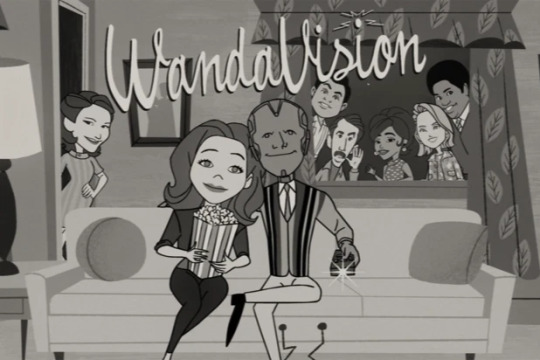
So the 60s is the era that Wandavision pulls most heavily from for it’s inspiration. So much so that one could make the argument that each of the first three episodes are all set in the 1960s. Episode one pulls from the early 60s with multiple Dick Van Dyke refences, episode two is very Bewitched inspired, and episode three is aesthetically very similar to The Brady Bunch which started in ‘69. As such it was hard to narrow down the list for this decade and I had to get creative in some ways.
1. The Andy Griffith Show (1960 - 1968)

The Andy Griffith Show gets kind of a bad rap now a days for being, supposedly, a conservative’s wet dream. People claiming it as such have apparently never actually seen the series. Oh yes, it’s very much set in white rural 60s America and will occasionally present the obliviously outdated joke, but the story of a widowed sheriff being the only sane man in a small town full of lovable lunatics, who prefers to solve his and others problems with negotiation and hair brained schemes as opposed to violence has far more in common with modern day Steven Universe than whatever genocidal fantasy fake rednecks have in their heads.
As the gif above shows Andy Griffith was very subtlety progressive for its time. Andy was a stanch pacifist, pro-gun control, treated drug addicts and prisoners with respect, and all the women he would date had careers, ect. and so on. It’s not a satire making any sort of grand political statements but the series had a moral center that was far more left than many realize.
But if it’s not a satire, then what type of comedy is it?
The Andy Griffith Show excels in what I like to call, ‘awkward comedy’. See everyone in Mayberry is far too nice to just come out and tell a character they’re making an ass of themselves, so therefore whoever is the idiot punching bag of the episode’s focus must slowly unravel as everyone looks on in helpless pity until said character realizes the folly of their ways and the townsfolk come together to make them feel happy and accepted once more. Wandavision takes this polite idyllic awkwardness and plays it up for horror instead of laughs.
2. The Dick Van Dyke Show (1961 - 1966)

The creators of Wandavision actually met with Dick Van Dyke himself to pick his brain and learn how sitcoms were made back then. Paul Bentley also took inspiration from Van Dyke in his performance of the sitcom version of Vision, while Olsen stated Mary Tylor Moore had a heavy influence on her character of Wanda. But more than just being a point of homage, The Dick Van Dyke Show was hugely influential in modernizing the family sitcom and breaking a lot of the unspoken traditions and ‘rules’ of the 50s television era. It’s also just really, really funny.
3.The Alfred Hitchcock Hour (1962 - 1965)
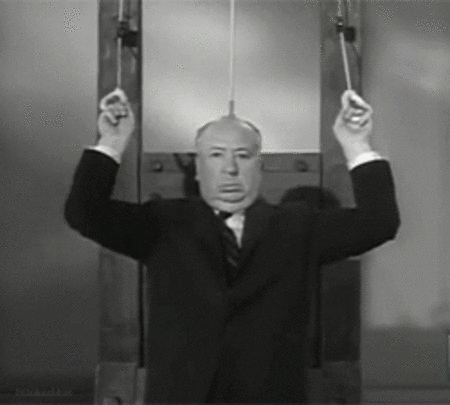
Bit of a cheat here. Alfred Hitchcock Presents actually started in 1955 as a half hour anthology show, but in ‘62 the show got a revamp and was extended into a full hour tv series. I knew I wanted The Twilight Zone to be covered in my episode one recap, but ‘The Master of Suspense’ couldn’t be forgotten. While The Twilight Zone reveled in the surreal and supernatural, Alfred Hitchcock pioneered the thriller genre and made real life seem dangerous, horrifying, and other worldly.
4. Doctor Who (1963 - present day) vs Star Trek (1966 - present day)

Just like how westerns dominated the air waves during the 50s, science fiction was the center of the cultural zeitgeist of the 60s. From Lost in Space to My Favorite Martian, space aliens and robots were everywhere. So naturally I had to name drop the two sci-fi juggernauts that still air to this today. If you thought that the rivalry between Star Wars and Star Trek was bad then you’ve never seen a chat full of Whovians and Trekkies duking it out over who is the better monster, the Borg or the Cyberman. But which one has the more influence over Wandavision?
Well Star Trek owes it’s existence to sitcoms. As with The Twilight Zone before it, Star Trek was produced by Desilu Productions and it’s co-founder and CEO, Lucille Ball, was the series biggest supporter behind the scenes, lobbying for it when it faced early cancelation. As with all things sitcomy, everything ties back to I Love Lucy in the end. However despite that little backstory, it would seem that the series has very little to do with Wandavision itself beyond being quintessentially American.
I would argue that Wandavision owes much to Doctor Who though. Arguably more so than any show mentioned in this retrospective. Time travel, alternate realities, trouble in quite suburbia, brainwashing, people coming back from the dead, ect... just about every trope you can find in Wandavision has also appeared in Doctor Who at some point. As a series that can go anywhere and do anything, Doctor Who was a pioneer of marrying genres in new and interesting ways.
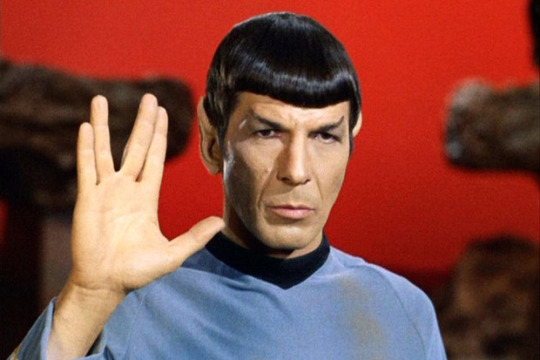
5. Bewitched (1964 - 1972) and I Dream of Jeannie (1965 - 1970)

It’s hard to pick one series over another because they’re essentially the same show. A mortal man falls in love with a magical girl who upends their lives with magic filled hijinks as they try their best not to have their secret discovered by the rest of the world. And both have their fingerprints all over the DNA of Wandavision.
There’s only two core differences; Samantha and Jeannie have completely different personalities, with Sam being confident and knowledgeable and Jeannie being naïve and oblivious, along with their relationships with their respective men, Sam and Darrin being married and in love at the start of the series and Jeannie chasing after Tony in the beginning in a will they/won’t they affair, finally only getting together in the last season.
6. The Munsters (1964 - 1966) vs The Adams Family (1964 - 1966)

Fans of these two shows are forever sadden that there never was a crossover between them. Because they’d fit perfectly together. Both shows are about a surreal and macabre family living in American suburbia and disrupting the lives of their neighbors with their otherworldly hijinks. Sound familiar?
The main difference between the two shows is the way the characters viewed their placement in the world they inhabit.
The Munsters were always oblivious to the fact that didn’t fit in. They just automatically assumed everyone had the same personal tastes as them. Whenever they encountered anyone who behaved strangely around them they would write that person off as being the odd one rather than questioning themselves. As such the main cast was structured like a stereotypical sitcom family who just happened to be classic movie monsters.
The Addams were well aware that they were abnormal and they loved it! They lived life with in their own little world and didn’t care what anyone thought of them. As such the characters were far more colorful and quirky as individuals but there was little in the way of refences to other horror franchises beyond just a general love of the twisted and strange.
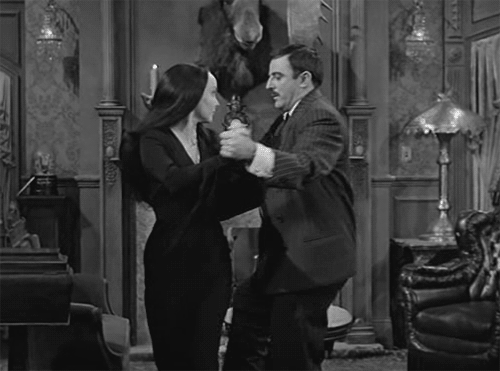
7. Green Acres (1965 - 1971) and the Rual-verse (1962 - 1971)
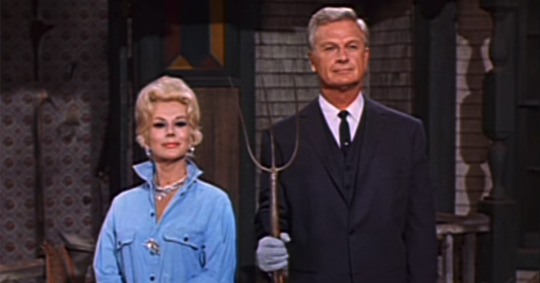
So the MCU is not the first franchise to bring viewers an interconnected universe to the small screen. Far from it, as sitcoms had been doing this for decades, starting with the ‘rualverse’. Beverly Hillbillies, Petticoat Junction, and Green Acres were all produced by the same company and were treated as spinoffs of each other, complete with crossovers and shared characters and sets.
Of the three, the last show, Green Acres, has the most in common with Wandavision. A well to do businessman and his lovely socialite wife settle down in small town America on a farm in order to get away from the stresses of city life, only to find new stresses in the country. Eva Gabor, herself a natural Hungarian, plays the character of Lisa as Hungarian making her one of the few non-native born Americans on tv screens during the cold war. Despite her posh nature and original protests to the move, Lisa assimilates to the rural life far easier than her husband, Oliver. Who, as the main comedic thread, can’t comprehend his new quirky neighbors’ odd and often illogical behavior.
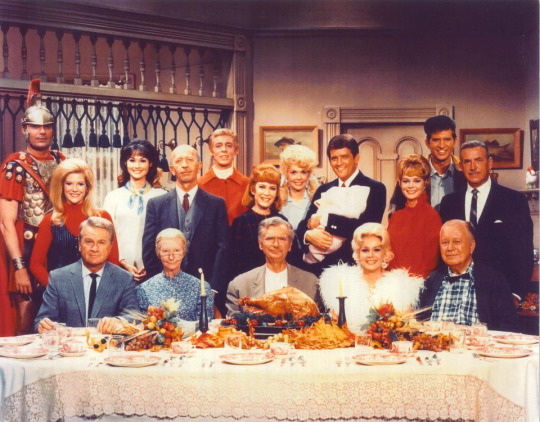
8. Hogan’s Heroes (1965 - 1971) and Get Smart (1965 - 1969)

So as comic fans have been quick to point out, it’s looking like both A.I.M. (Hydra) and Sword (Shield) will be players in the story of Wandavision. To commemorate that here’s two shows to represent those opposing sides. Although in truth, neither series has anything else in common with each other but I need to condense things down someway.
In Hydra’s corner we got Hogan’s Heroes. A show all about taking down Nazis from within.
I love, love, love, ‘robin hood’ comedies where a group of con artists try week after to week to pull one over the establishment. The Phil Silvers Show, Mchale's Navy, and Top Cat, just to name a few examples are all childhood favorites of mine. However while those shows had a lot of morally ambiguous characters, Hogan’s Heroes has very clear cut good guys and bad guys, cause the bad guys are Nazis and the show relentless makes fun of the third reich as should we all. In fact I was watching Hogan’s Heroes while waiting for the GA run off election results. Fortunately my home state decided to kick out our own brand of Nazis this year.
For Shield, we got the ultimate spy spoof, Get Smart. Starring, Inspector Gadget himself, Don Adams, as the bumbling Maxwell Smart. Get Smart, is a hilarious send up of Cold War espionage but the real selling point of the show, imho, is Max and his co-worker 99′s relationship. You can cut the sexual tension in the air with a knife all while laughing your ass off.
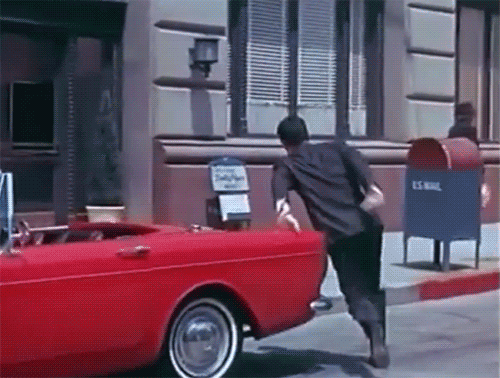
9. Batman (1966 - 1968)
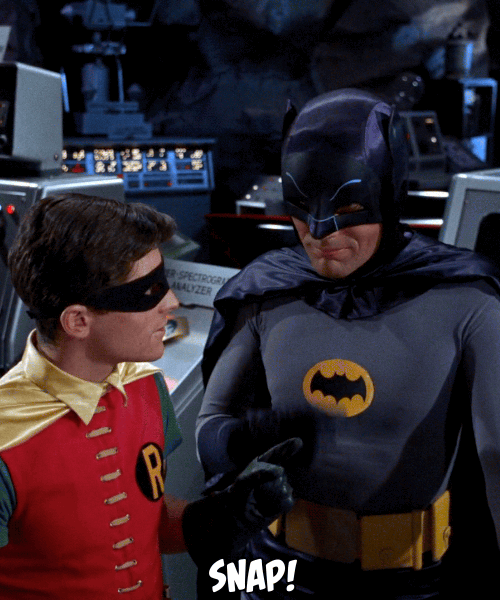
First was Superman and then came Batman. Yet while Superman was a serious action show, Batman was a straight up comedy. Showcasing that superheroes could indeed be funny.
Also shout out for Batman being the only show on this list to have an actual crossover with it’s competitor, The Green Hornet.
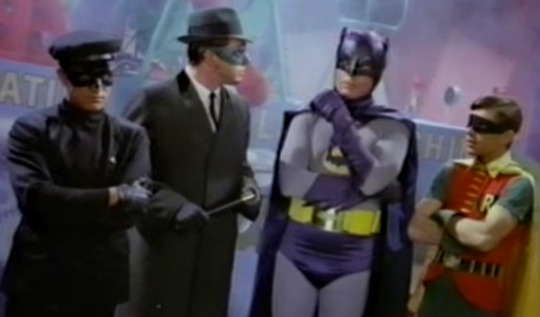
10. Julia (1968 - 1971)

Since episode two features the first appearances of Herb and Monica, let’s highlight the first black led sitcom since the cancelation of Amos ‘n Andy over a decade earlier. The show focuses on single mother and military nurse, Julia, as she tries to live her life without her recently decease husband, who was killed in Vietnam, as she tries to raise their six year old son on her own.
The series is cute. It’s more of a throw back to earlier family sitcoms where there’s no fantasy and life lessons are the name of the game. It’s the fact that the main character is a single black woman is what made the show so subversive and important at the time.
Runner Ups
There’s much good stuff in the 60s, so here’s some others that didn’t make the cut but I would recommend anyways.
Car 54, Where Are You? (1961 - 1963)
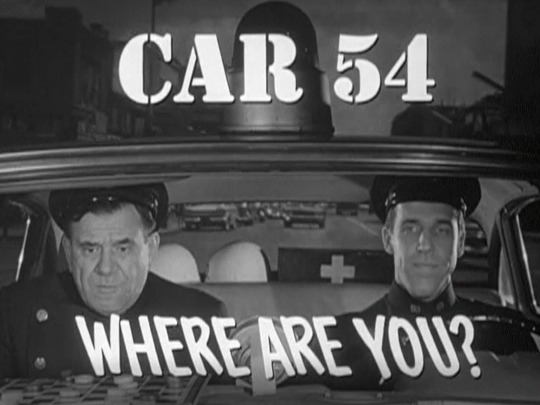
I call this the Brooklynn 99 of the 1960s. Bumbling but well meaning Officer Toody longs to do good in the world and help anyone in need, but often screws things up with his ill thought out schemes. He often drags his best friend and partner, the competent but anxiety riddled, Muldoon into his escapades.
Mr. Ed (1961 - 1966)
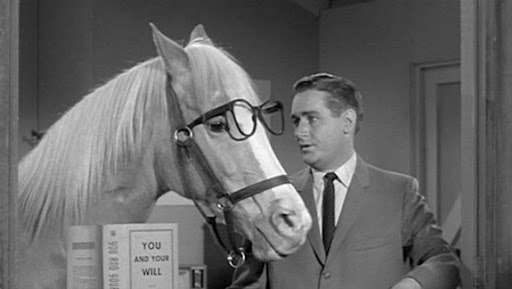
The grandfather of the sarcastic talking pet trope.
The Jetsons (1962 - 1963 and 1985 - 1987)
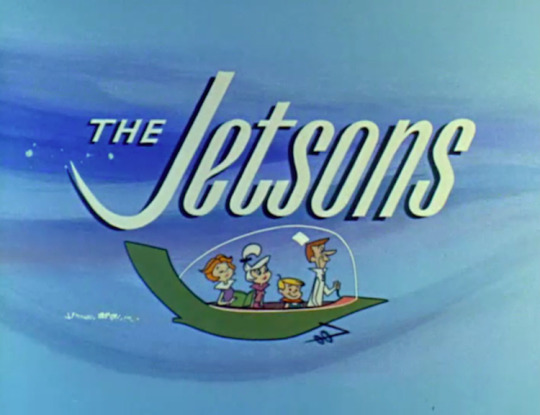
Hanna-Barbera often took popular sitcoms and just repackaged them as cartoons with a fantasy theme to them. The Jetsons has no singular show that it rips-off but is rather more a grab bag of sitcom tropes that feature, robots, computers, and flying cars.
The Outer Limits (1963 - 1965)

The Outer Limits was The Twilight Zone’s biggest competitor in terms of being a sic-fi/horror anthology series.
Gillian’s Island (1964 - 1967)
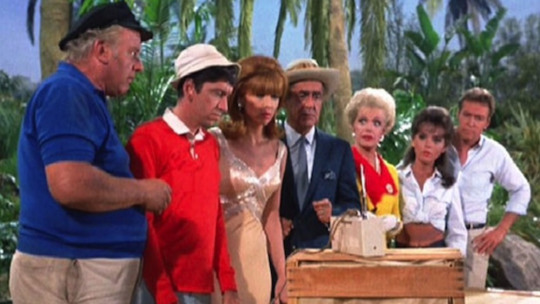
The only comparison to WandaVision I could think of was that this is a sitcom about people being trapped in one place. But by that point I was running out of room on the list. Still it’s one of the funniest shows on here.
So yeah, this took longer than expected cause there’s a lot, here. Hopefully the 70s will be easier. Which I’ll post on Friday.
114 notes
·
View notes
Text
Loki x Sylvie Playing House Part 3 (Humor, Romance), Rated T. Full on Sylki hijinks, as promised!
Masterlist of my Sylki fanfics here.
---
The first thing she does when Thor leaves is Google herself. Apparently, she was a child actor and made a fortune there, before transitioning into modelling, and later into a successful influencing career.
"That makes perfect sense to me", Loki comments. "If I was not a prince, I would have chosen to be an actor too. Just imagine, legions of fans screaming your name, begging for your attention for just one moment, hanging onto your every word, willing to worship the very ground you walk on. Now, that is the dream." He pauses, cherishing the image in his head. "There's also the money. Looks like you and I will never have to work a day in our lives. We can just live off your money."
[[MORE]]
Sylvie feels the muscles in her laws instinctively tense. This is not her life, or her reality. She can't imagine spending eternity here. She looks at Loki sternly. "We can not. We have to return to the TVA."
"Yes, of course." He agrees immediately. A part of him likes this life. But another part of him knows there is never a gain without a loss. The universe finds a way to make him pay for every bit of happiness he ever gets. Who knows what the price may be if he chooses to stay, with his family, and with Sylvie right here?
Sylvie sets down the laptop on the bedside table, ignoring the danger of Loki's glass being knocked over and drenching it. She cannot let herself be concerned with such simple things. Ignoring them is the surest way to covince herself she hates it here. "I was wondering, if Thor can get into this town, and if he remembers us leaving this town in the past, does it mean we are free to leave?"
Loki studies her features, the resolute glint in her eyes and the defiant stance of her chin. It is clear that she will stop at nothing to get back to the TVA. "We should test it out." He says, trying to sound as calm as possible. "Where do you wanna go?"
"Maybe we can go to Oklahoma? See my supposed parents?" She attempts to play it off like it's nothing, even though she knows exactly what it means- temptation. The urge to see what this life looks like is ever-growing.
"Why can't we go to Asgard and see my parents instead?" He counters immediately.
Sylvie purses her lips, trying not to reveal her emotions. She doesn't remember her Odin or Frigga at all. A part of her longs to meet this version of them, but another part wonders how overwhelming it would feel, watching Loki occupy her place, have her life, her "parents" in this timeline. "Fine. How about we pick a neutral location first?"
"Fine." He replies curtly.
"Fine!" Her irritation escalates. She grabs the laptop again, opening up a tab to a travel website, ready to book a flight.
"LA?" He suggests.
"You just want the paparazzi attention, don't you?" She points out, but doesn't resist. "Alright."
September 1st. The date is set. They will be off to LA within three days, and if whatever being that has placed them here does not want them to leave, they will know by then.
---
"Do you really need all of these sunglasses?" Sylvie asks, after Loki stashes the fifth one in his backpack.
"Of course, I do." He defends. "Style? Remember?"
"Travelling light, remember?" She hits back, taking out two random pairs and throwing them back on her dresser. "Just take what you absolutely need."
"I absolutely need my sunglasses." He says stubbornly.
She can either give in on this trivial matter, or she can dig her heels in and fight it out with him. A stupid pair of sunglasses is not worth the effort. "Fine." And in return, there's something that he has to compromise for her as well. "Only if you help me get my swords past security."
"With pleasure." He says with a grin, and with a wave of his hand, the newly arrived swords from eBay are magically cloaked.
Sylvie looks at her own luggage. She has never really owned anything. She jumped from one apocalypse to another, with only her life, and sometimes food supplies for a few days. It feels surreal to look at the clothes in her wardrobe now. The thought of carrying them with her feels even more foreign.
She looks at the tons of products on her dresser, skin creams, lotions, toners, cleansers and heaven knows what else. All the luxuries she never had.
All the luxuries she does not want.
"I'll just pack a change of clothes." She says finally.
"You don't want anything else?" He asks, surprised.
"These are just things, Loki." She explains. "They can be replaced. I have no attachment to them."
---
She regrets not booking first class. She has been on planes before, using crashing aircrafts as a temporary hideout spot to regroup when the TVA was on her tails. As a stowaway, she never realized just how annoying a plane journey can actually be.
Loki graciously offers her the window seat, noting her unease as soon as they board. She thanks him with a smile, and they nod in mutual understanding.
She stares out of the window, at the town that is supposedly her home, and for the first time ever, she feels a pang of homesickness for a place that is not Asgard. She has been here for just five days now, yet, the thought of sleeping in her own bed is so tempting.
Sylvie notices how she is thinking of the bed as her bed now, but tries not to dwell on it too much.
The plane takes off without incidence, and she dozes off quickly. When she wakes up, she notices a thin comforter wrapped around her shoulders. Turning to her side, she sees Loki sleeping as well, his mouth slightly agape. She snuggles close to him, suddenly needing the comfort of his warmth, and the woman on the aisle seat gives her a dirty look. There's a baby crying somewhere in the back, and what feels like the beginning of a massive headache. But all that fades away when she lays her head on his shoulder.
---
When the flight arrives at LAX, they are both a little scared to leave its comfort. They are about to find out if they are free to travel wherever they want, or whether the action had any consequence. Sylvie is the first to take a step out, and they are both relieved to see nothing happens. The baggage claim goes smoothly, though slowly, and they get a cab quickly. Sylvie hides her grin when she sees Loki put on his sunglasses.
"So we're here." He says, staring at Sylvie, while she stares out of the window.
She only hums in response.
"Is this your honeymoon?" The driver asks.
Loki laughs nervously. "No, no. We've been married for quite a long time. This is just... a vacation."
The driver recommends them a lot of tourist places. Sylvie tunes him out. This is just a test. She has no interest in touring LA. They have their return flight scheduled for the next day.
They check into their hotel room, and she plops down on the bed immediately. "It seems we are free to leave the town. Just not the reality, I suppose." She runs her hands over the silky sheets, amused. "I must say, whoever placed us here has taken every measure to make this prison comfortable."
Loki follows suit and takes a seat beside her. "I suppose that is indeed generous of him. Or her."
Sylvie turns to the side to look at him. "So how do we get out of here then? Got any plan?"
He shrugs. It's not like there's a book called What to do when you find yourself trapped in an alternate universe with your alternate self for Dummies. "Right now, the plan is to get some dinner, then some sleep. Then perhaps in the morning we can see a bit of LA?"
"You want to play tourist?" She asks in a neutral tone.
He replies in kind, testing the waters. "We are here already, and we have the time, so why not?"
"Okay." She replies, a little unsure, but not entirely opposed to the idea. The weariness of the journey starts taking its toll on her. She messages her temples with her fingertips. "Should we order room service?"
Loki contemplates for a moment. On the one hand, she looks really tired, and she could use a good night's sleep. On the other hand, she has been completely on edge and razor focused on the mission since they got in this mess. Well, since they met, actually, and probably for centuries before that. She could also use a bit of fun and relaxation.
With that in mind, he carefully voices his proposal. "I was thinking maybe we can go down to the restaurant and have a proper dinner."
Sylvie looks up, grinning mischievously. She's about to call his bluff. "What, like a date?" His deer-in-the-headlights reaction makes her laugh. "Calm down, I'm just teasing you."
---
It's not a date, but it kind of is. It's a four course meal and a fine bottle of champagne over candlelight, after all.
"Was it like this? Back at Asgard?" Sylvie wonders.
"Mostly. But Asgard was grand, elegant. This is..."
"A cheap replacement." She completes.
Loki smiles. "Precisely."
They talk about their Asgard bedrooms, the similarities and the differences between their safe haven in the palace. An hour passes swiftly.
"The wine is good." Sylvie comments, sipping on her first glass of wine, when the champagne is drained.
"Yes, quite good." Loki agrees, on his first glass as well.
The tiniest buzz starts to take root in him, and his mind wanders into the realm of possibilities, the future he can have, here and now. His eyes focus on the brighest object in front of him- Sylvie.
She feels her cheeks flush under his gaze. "Why are you looking at me like that?"
"You are just so..." He blinks. What is another word for Asgard's Sun when it disappears into the azure lakes? "Breathtaking"
Her lips curve into a shy smile. This is the beginning of the same foolishness he showed on the train in Lamentis-1 that almost got them killed. But right now, their life isn't in imminent danger. Right now, she is just amused. "Wow, you really can't hold your liquor, can you?"
"Of course I can. I am Loki, Prince of Asgard." He declares proudly.
"Yes, yes, I've heard the speech." She says it with a smile and an eye-roll. "We should get you upstairs."
He objects immediately. "But I'm not done yet."
"Oh, I think you're quite done." She beckons the nearest waiter. "Can we get the bill, please?"
He can still walk surprisingly well, but she holds his hand tightly, just in case he decides to take a detour, and drags him into the elevator.
"Blonde looks good on you." He comments out of the blue. "Maybe I should go blonde too."
She grins. "Like Thor?"
He glares at her. "You're a buzzkill."
---
Sylvie opens the door after fumbling with the keys for a minute. She is starting to feel the effect of the alcohol as well. She takes off her shoes and her earrings, while Loki runs to the loo.
"Why did you book a room for two?" He asks in a serious tone, leaning against the door-frame of the bathroom.
Sylvie freezes, her hand hanging mid-air for five uncomfortable seconds before she awkwardly drops it to her side.
Why did she book a room for two? She could have just rented separate rooms, or at least ones with separate beds. It's not like she and Loki are actually together.
But they have been. At least for the past few days. Why do they need separate rooms here when they share a bed back home?
Home. Sylvie realises with alarm that she's thinking of her prison as her home.
Is this reality starting to mess with her mind now?
"It's okay, I don't want to leave you either." Loki's voice pulls her out of her inner monologue. She turns around quickly in his direction. He's still drunk, and it shows, but he has a look on his face that she has never seen before- a mix of resolution and fondless. His eyes whisper silent vows of loyalty, and something else, something he can't quite express yet. "I will never leave you."
Sylvie smiles, closing the distance between them and standing next to him. Her hand finds his by sheer instinct. "Good to know."
"I mean it, Sylvie." He gives her hand a reassuring squeeze, before he tugs her along with him as he sits down on the bed, unable to stand any longer in his inebriated state. She is grateful to be seated too, and she's unsure whether it is just the alcohol. "I know you hate it here. But I like this." He indicates at her, then at himself, then back at her. "I like falling asleep next to you, and walking into the kitchen first thing every morning to see you cursing at the microwave. I like how you hum in the shower and scream at the TV."
Sylvie listens quietly, her eyes focused on the feeling of his hand in hers. She is trying to memorize this moment, burn the shape of his fingers and the feel of his touch into her brain, so that when it's gone- when he is gone- like everything in her life always is, she will have another good memory to relive again and again.
Loki continues. "I like the way you burn the pasta every time you try to cook."
"I don't burn the whole dish." She retorts playfully. "Just the bottom part."
He shakes his head to show he disagrees. "Can I tell you a secret?"
Her heartbeat quickens. Is he going to confess that he has feelings for her?
Does he have feelings for her?
"Sure." She barely whispers back.
Loki double-checks. "Promise me that you will never tell yourself?"
She laughs softly. "I promise."
Loki tenses, suddenly looking sober. He lets go of her hand, to rest his by his side, his fingers clenched into a fist. Mastering all his courage, he finally speaks. "I don't want to leave. Ever. I like it here."
Sylvie looks away, suddenly needing air. Hearing Loki say that makes her feel irrationally angry. He promised to be on her side every step of the way, but the minute he finds a life he likes, he's ready to throw in the towel.
A part of the anger stems from the fact that she knows, a major reason he wants to stay is her, this life he has with her. Two Lokis on any other timeline will cause Nexus events. But here, they are free to be together. Timelines don't start branching off like a growing vine on timelapse video every time they touch. And he wants that. She knows this because he has all but said it with his words and his actions.
And because she wants it too. Damn it, she wants it so much. She is getting sucked into this reality, indeed.
But she knows she has to finish what she started- she owes it to herself, and to the people out there who need her help, who will be robbed of their lives if she doesn't stop whoever is doing this.
She wants to-
- But she can't.
"Loki, I-" she stops when she turns around to see he has already fallen asleep. Wordlessly, she wraps the comforter over his sleeping form, before crawling under it herself. Turning to her side, facing away from him, she wonders what's next for them.
20 notes
·
View notes